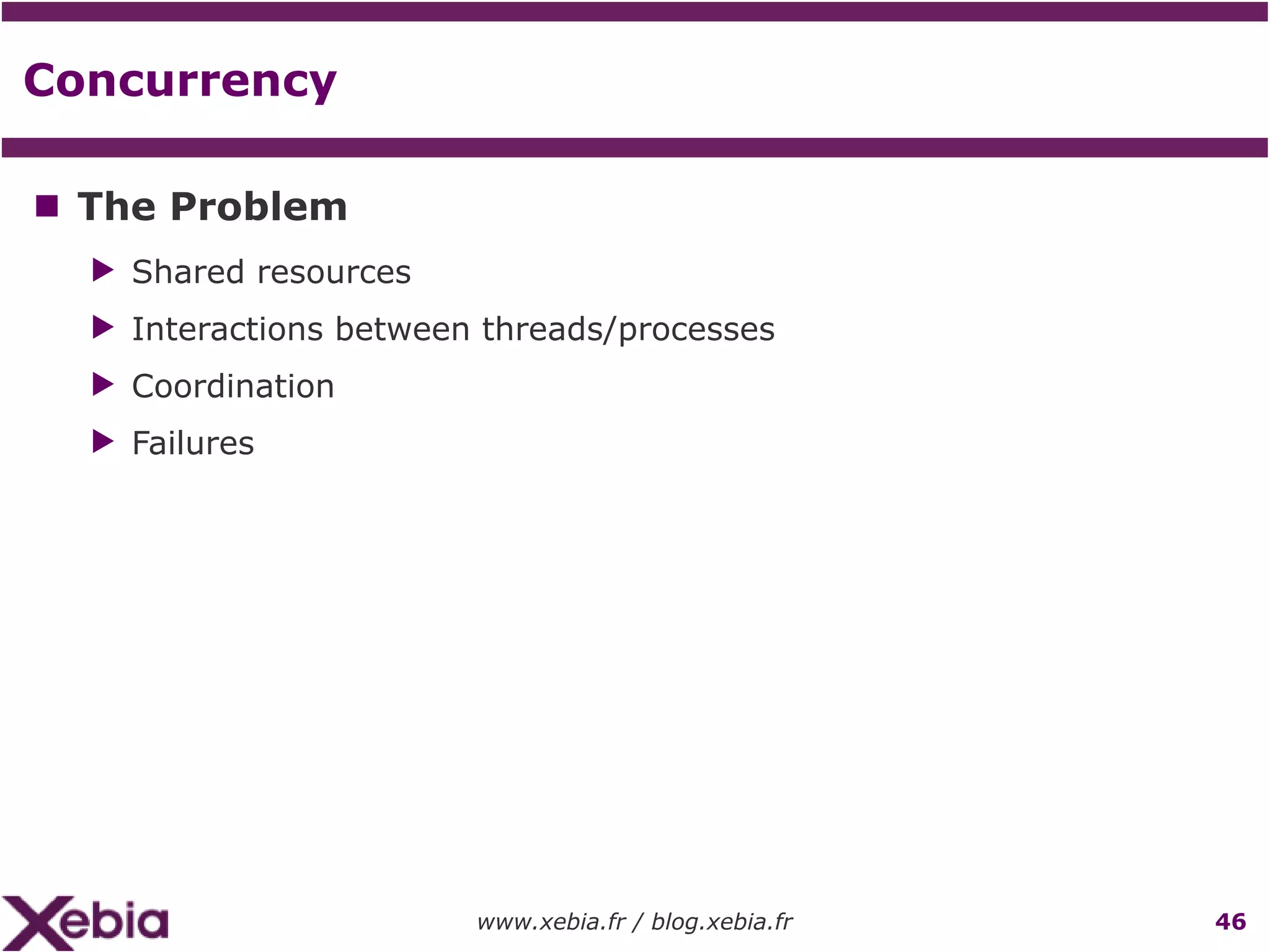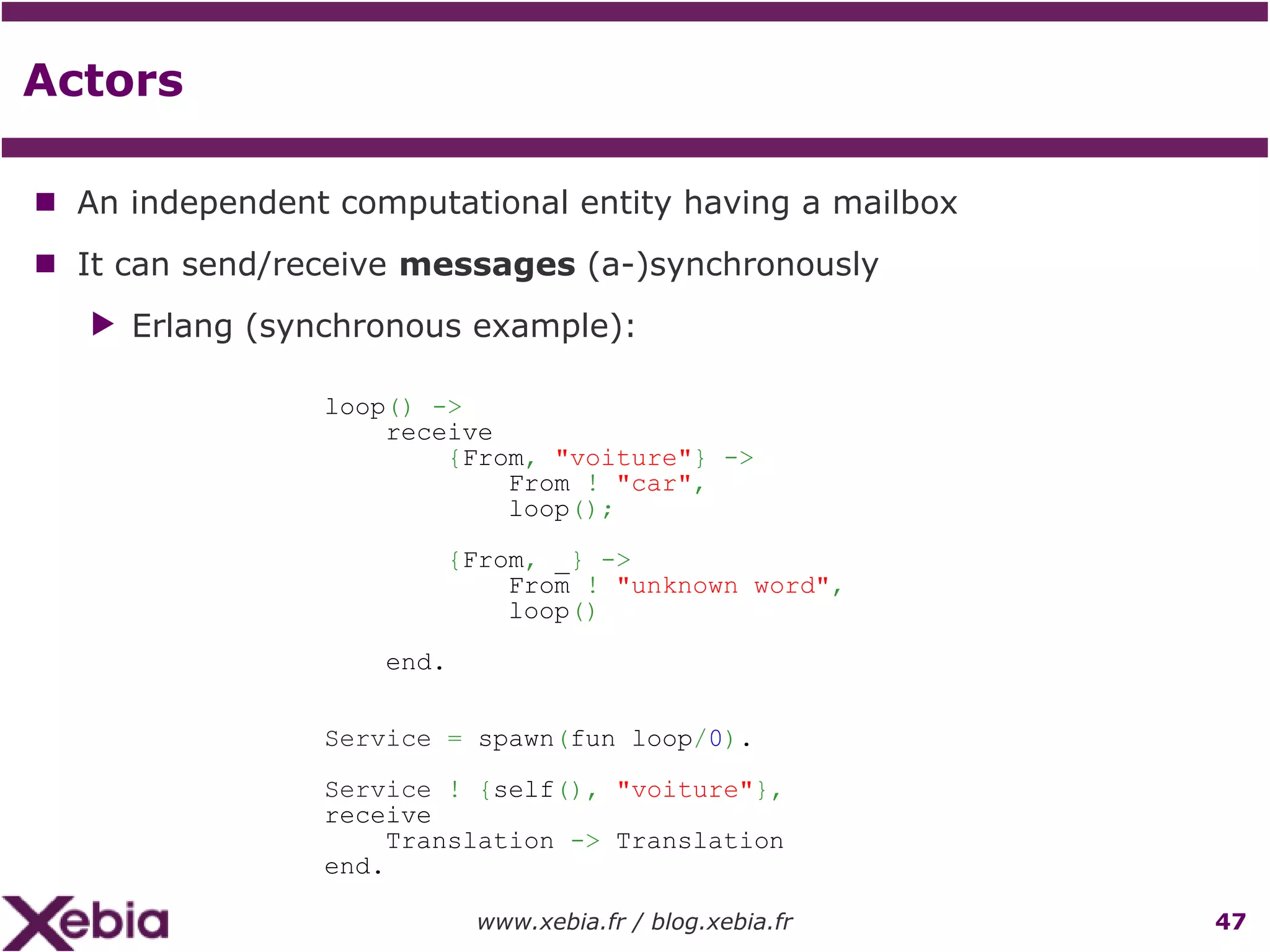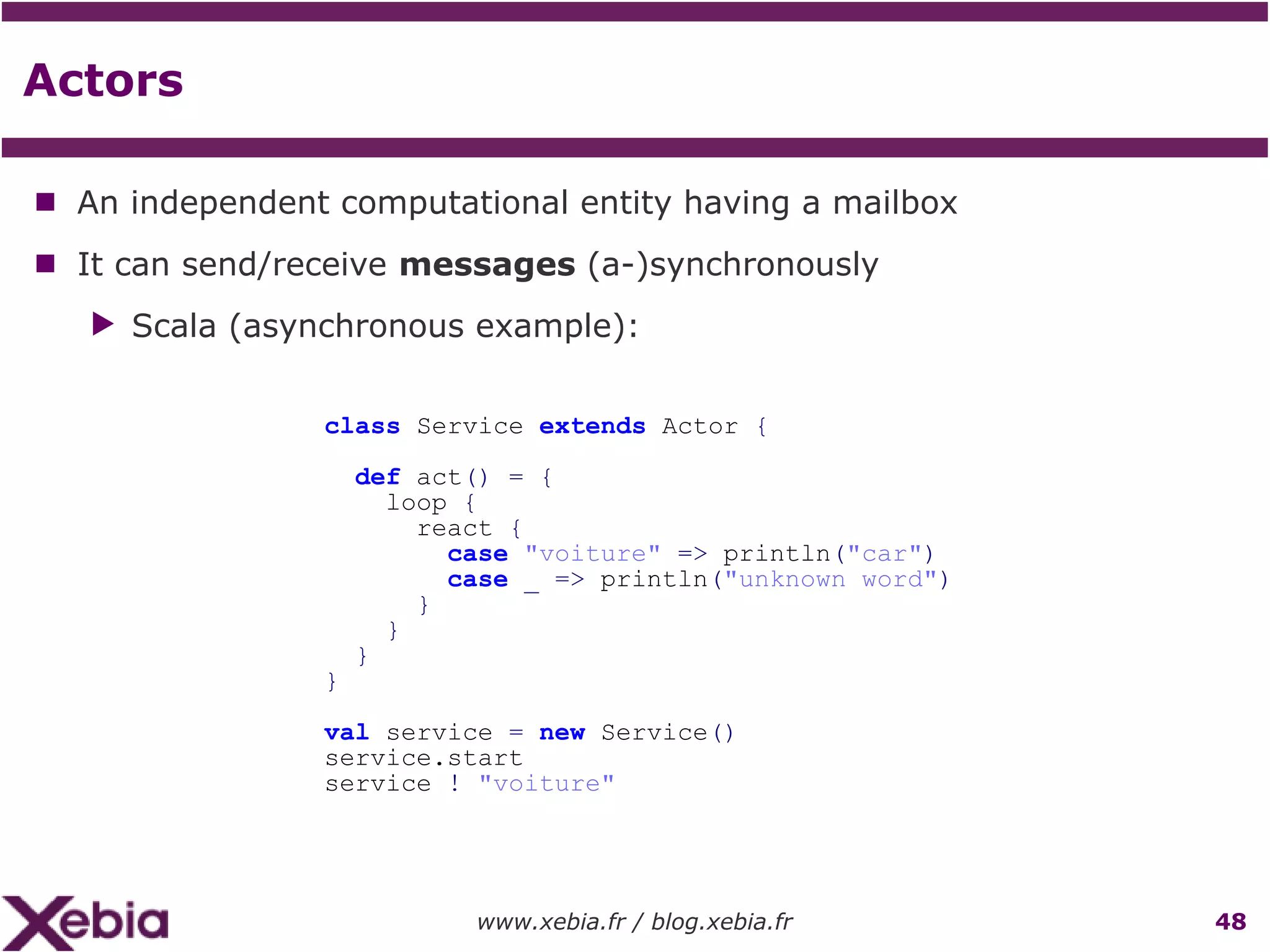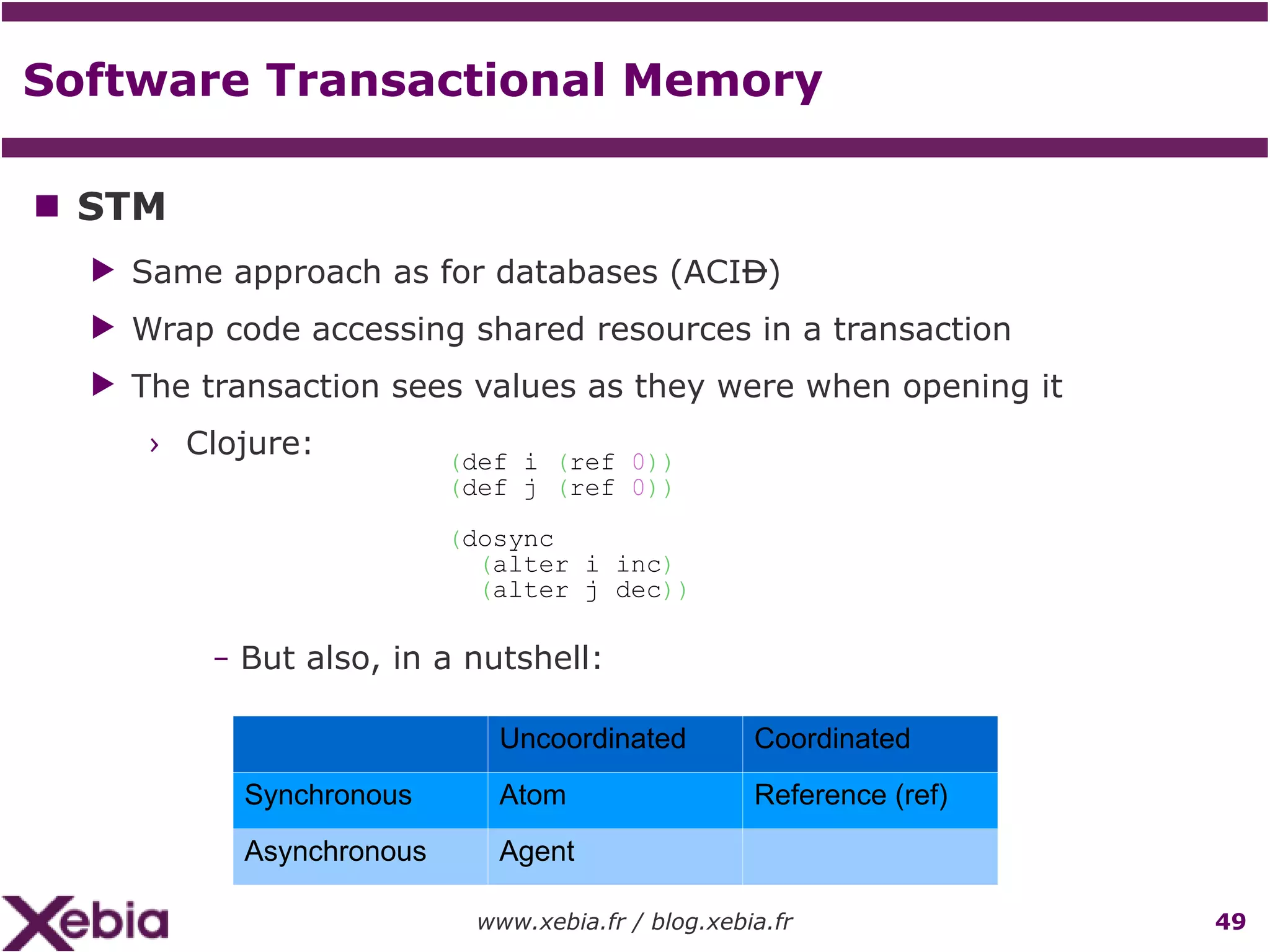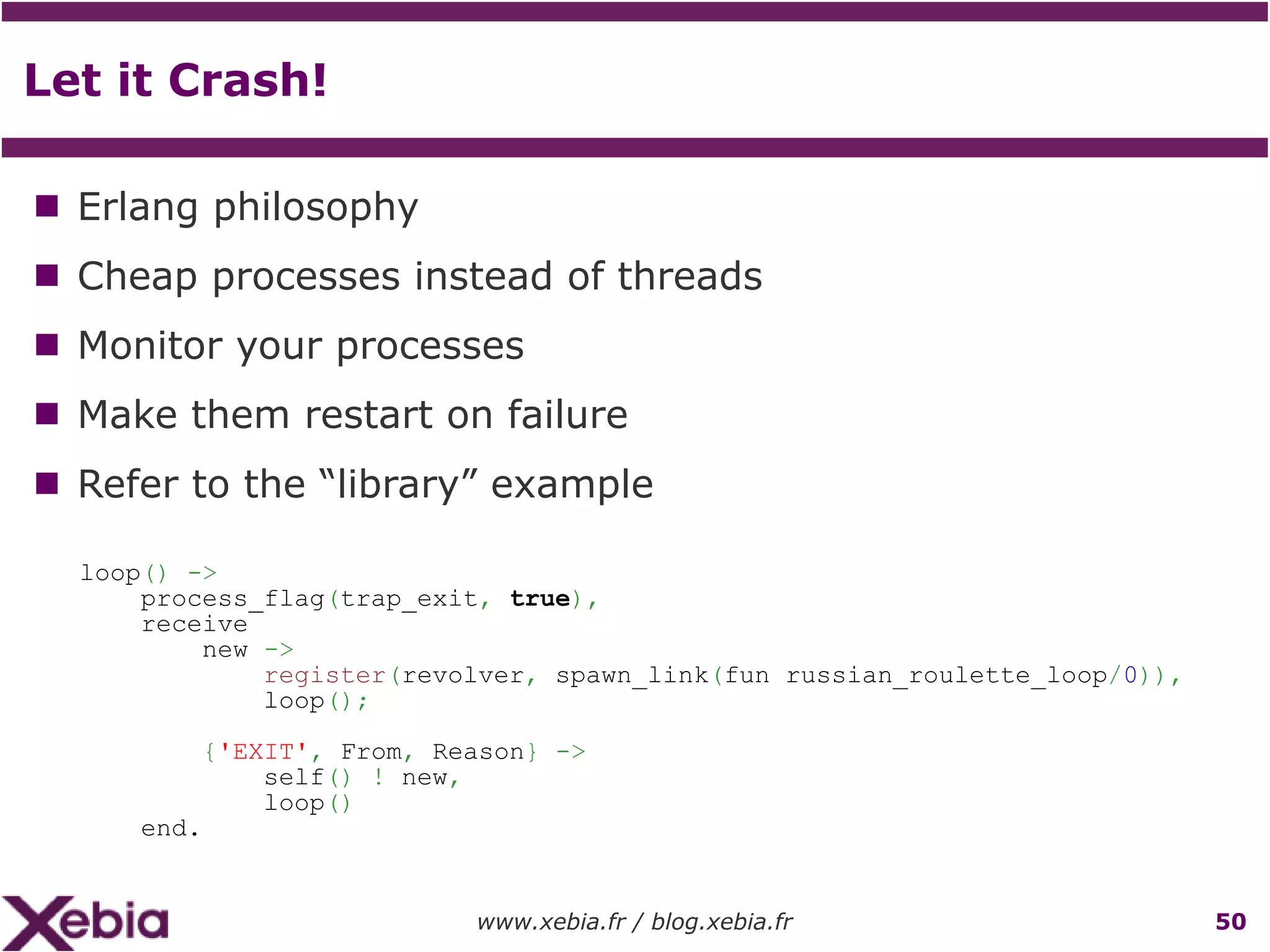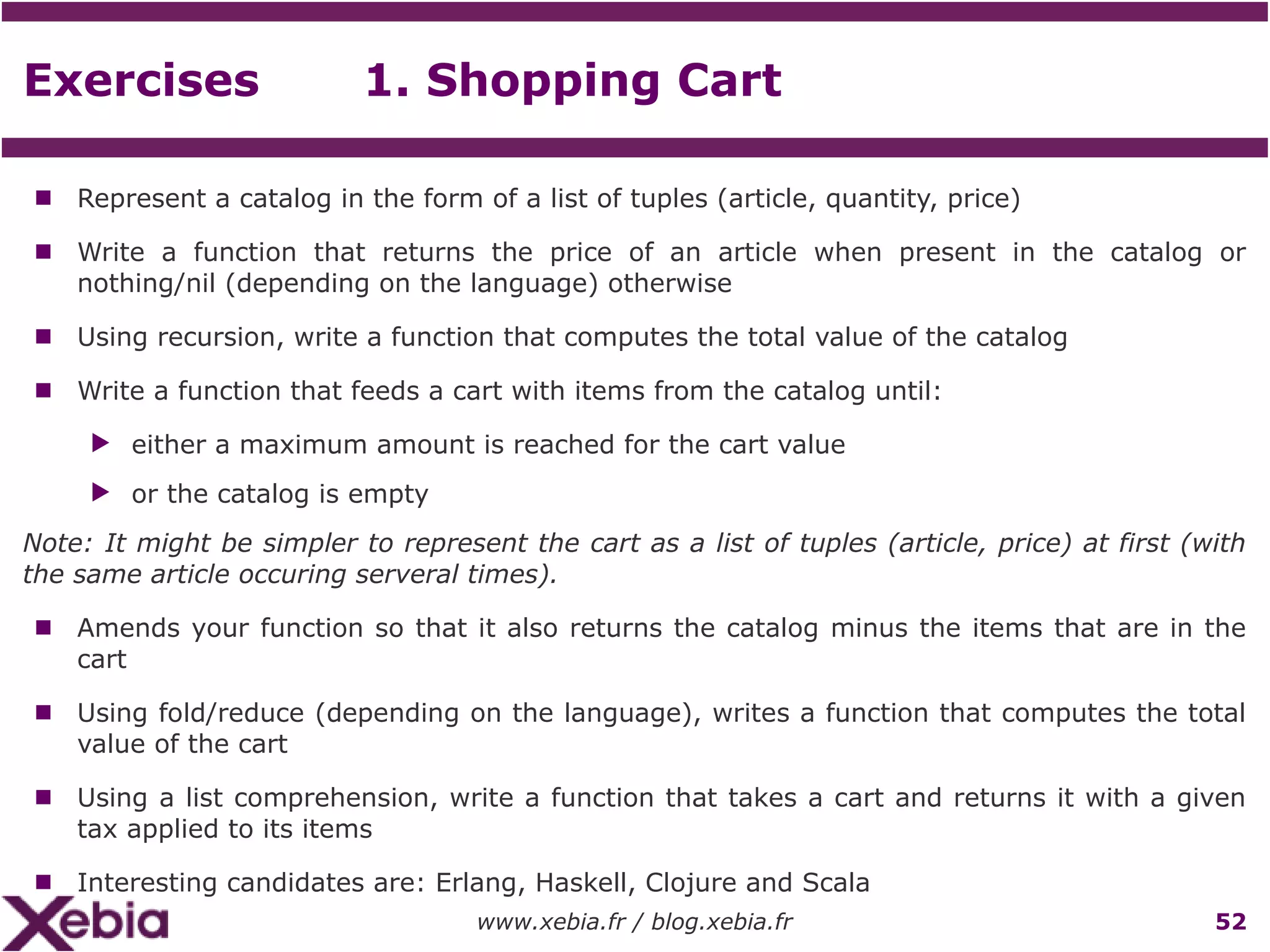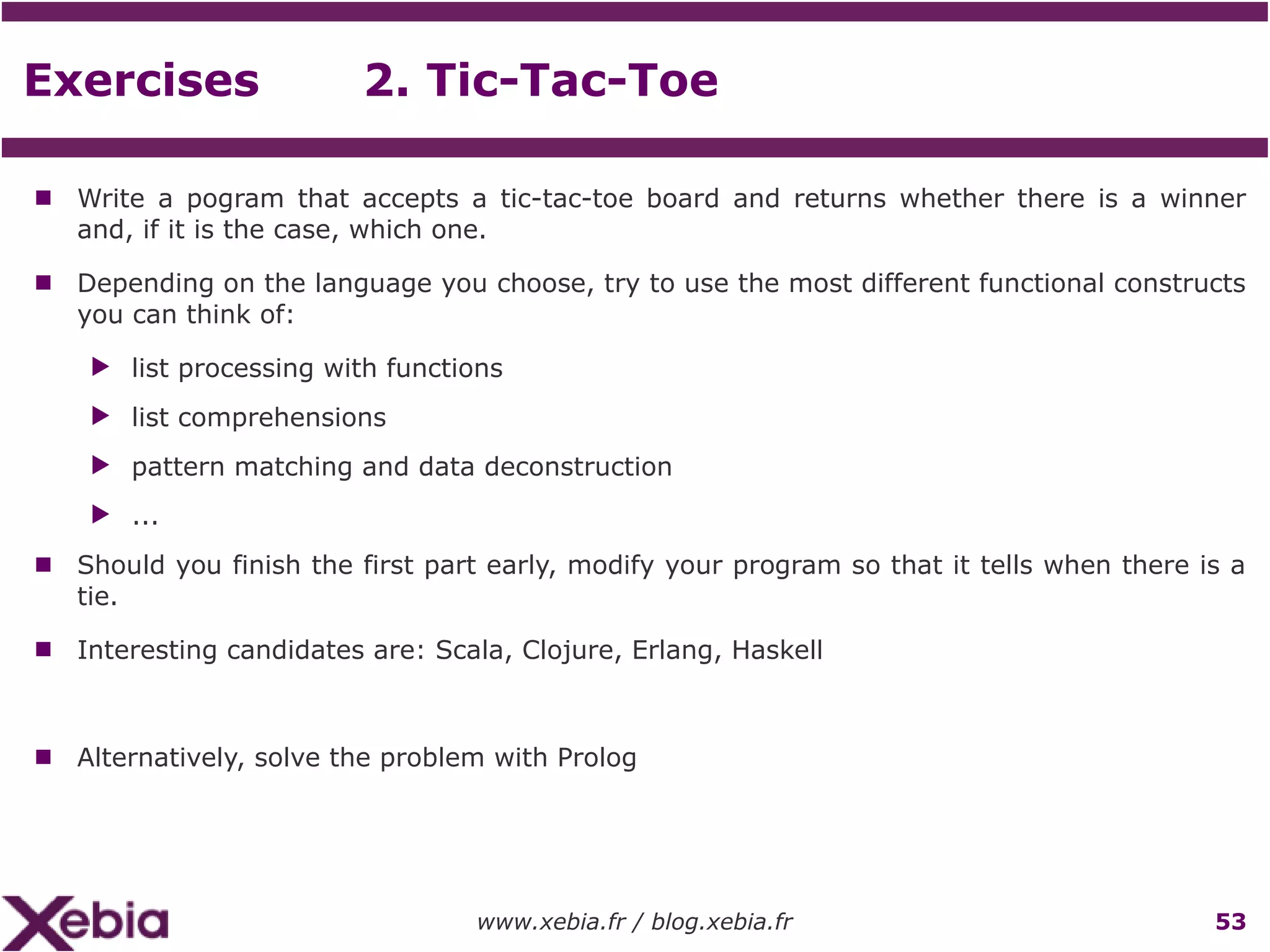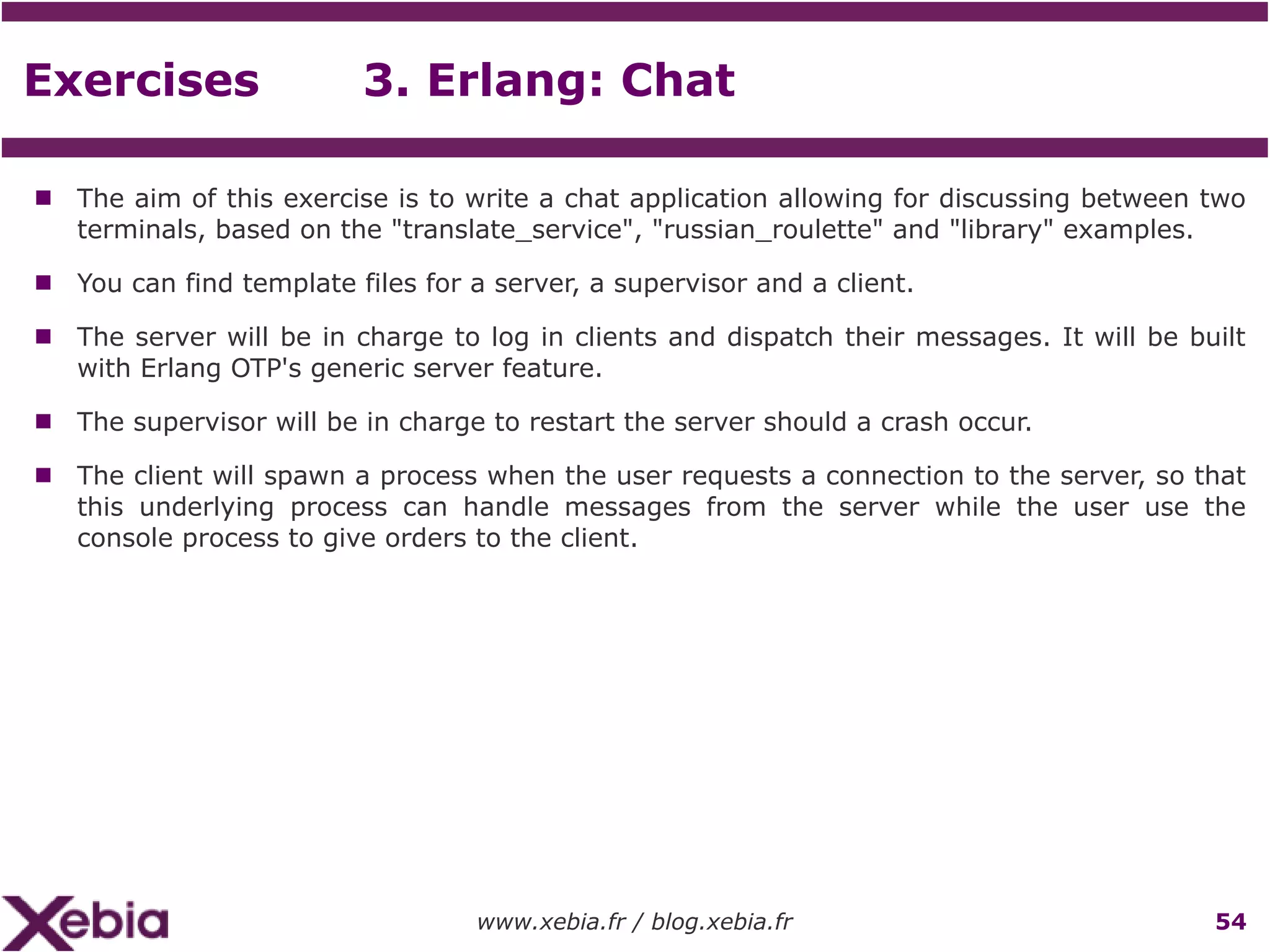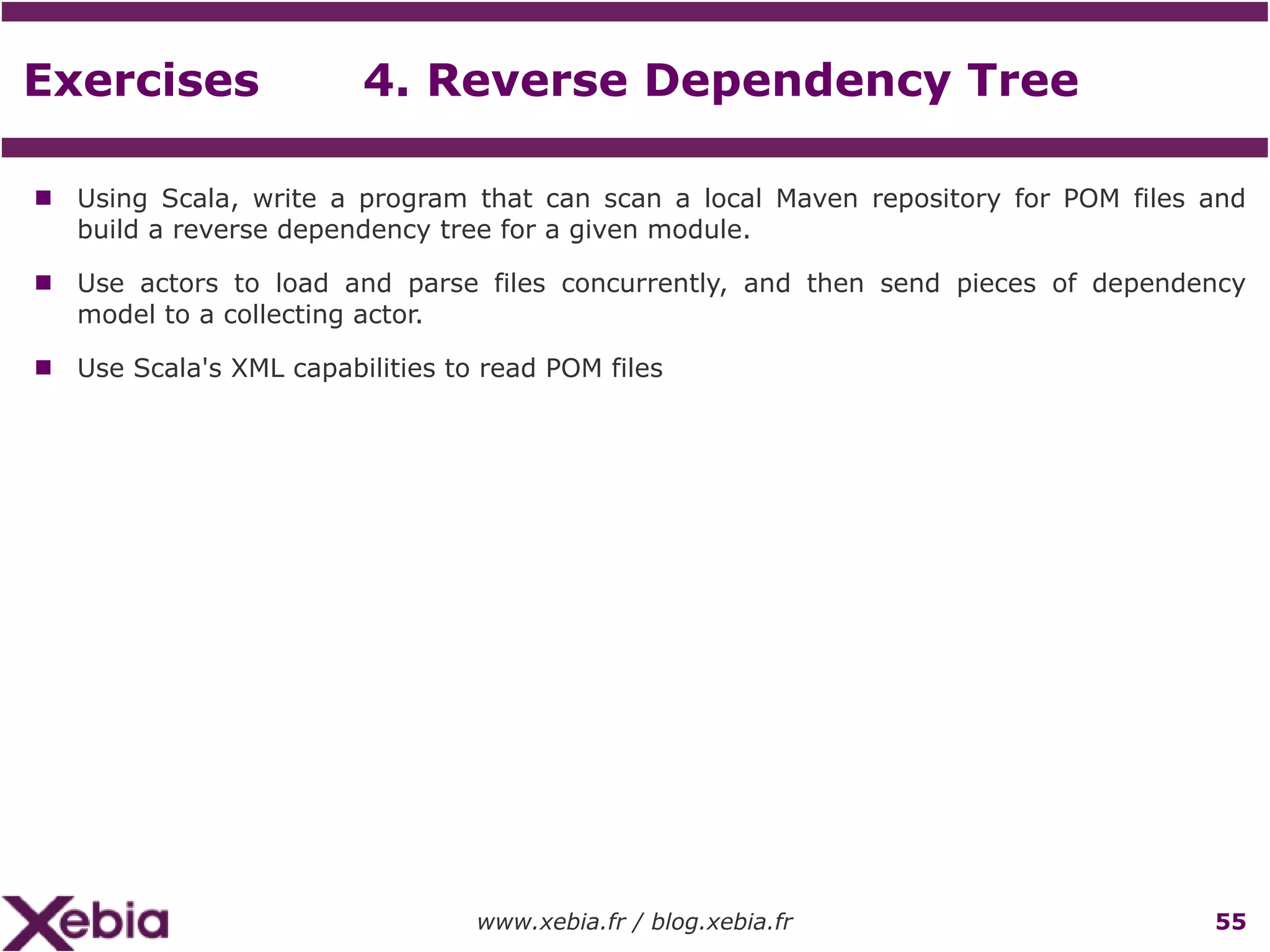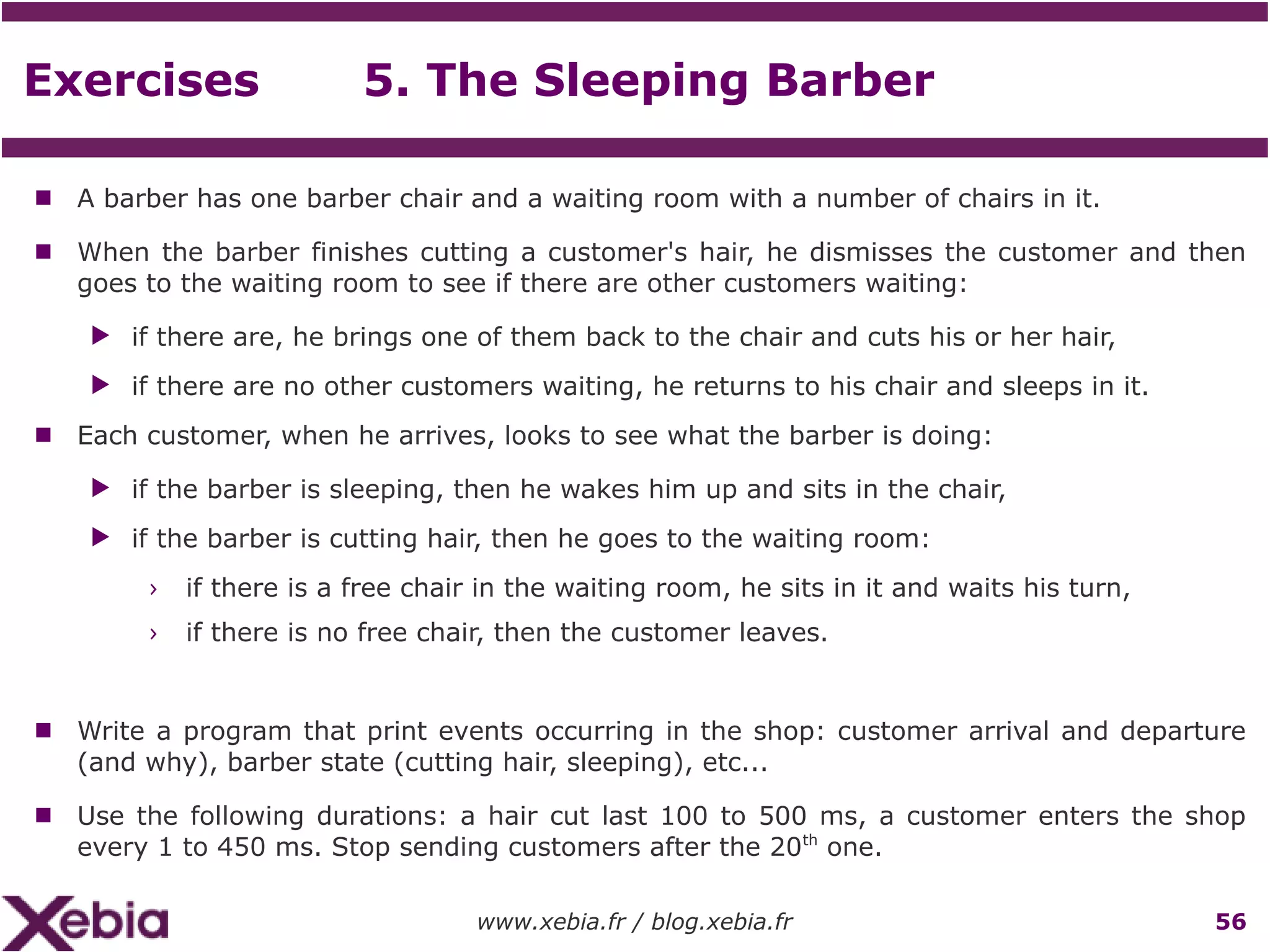The document presents an overview of various programming paradigms, including imperative, functional, logic, and object-oriented programming, highlighting their main features and constructs. It also discusses typing systems and introduces several programming languages, such as Erlang, Haskell, Ruby, Scala, and Clojure, along with their unique characteristics. Additionally, the document addresses concepts like type inference and dynamic languages, providing insights into language differences and capabilities.
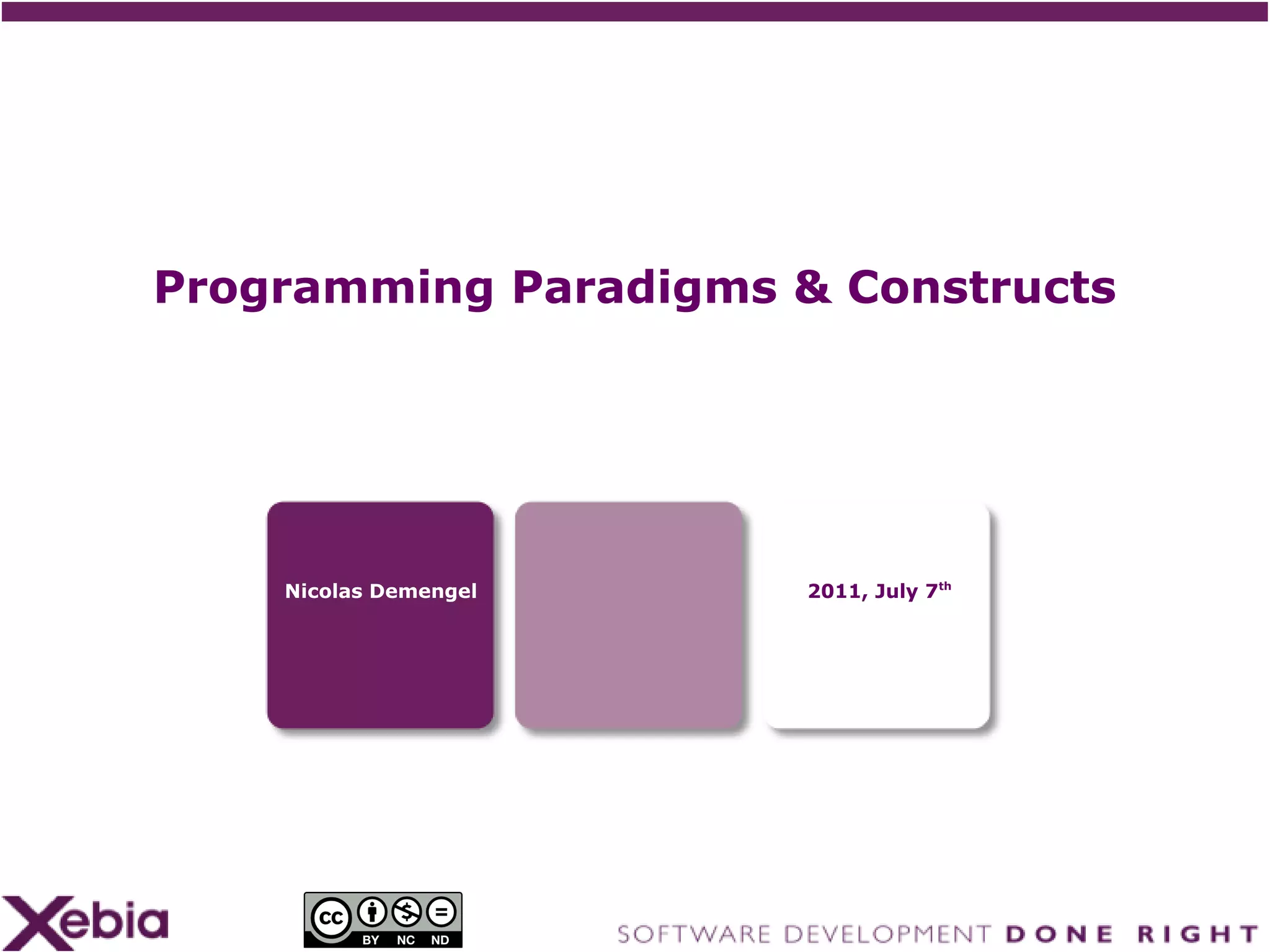
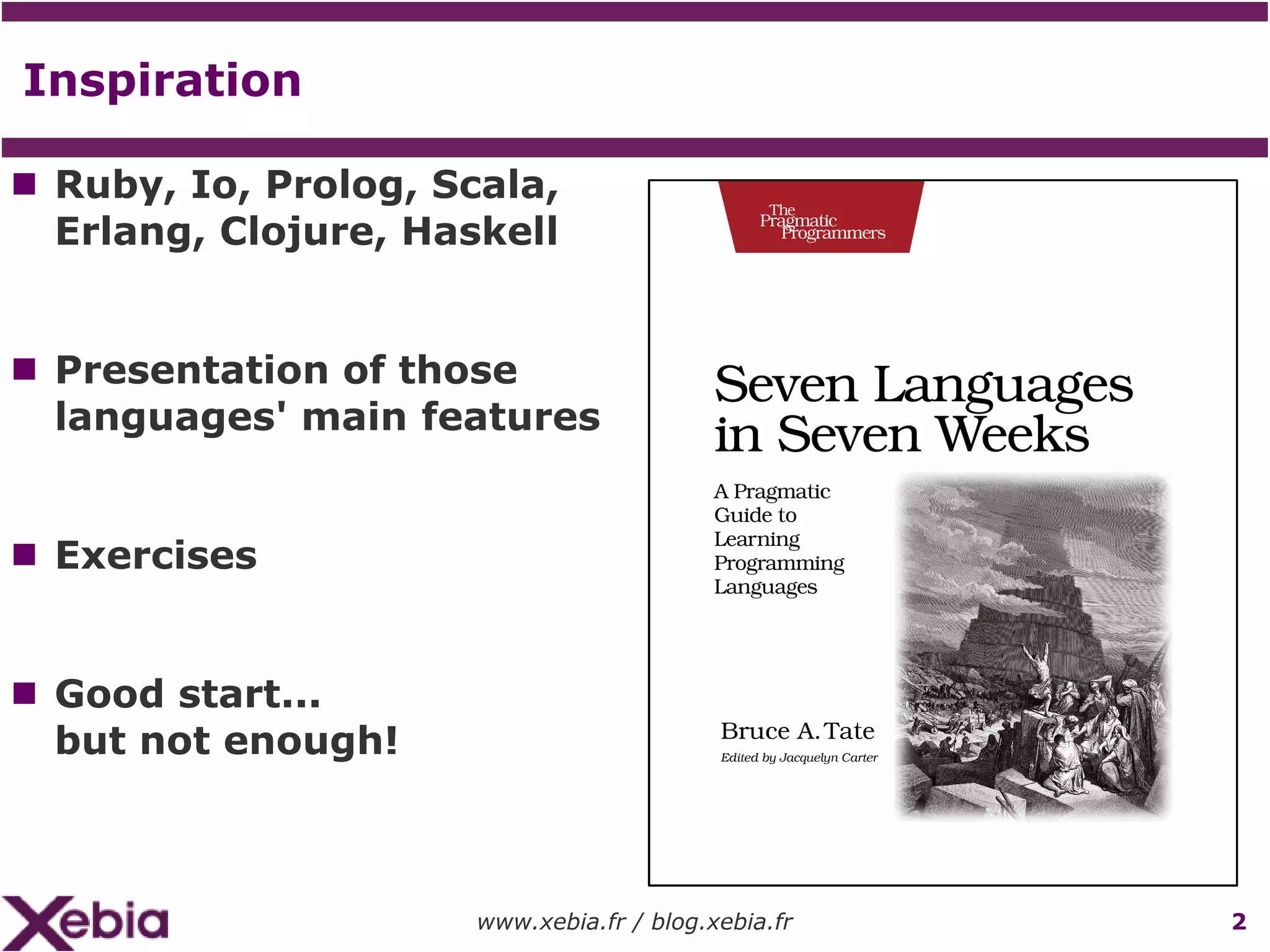
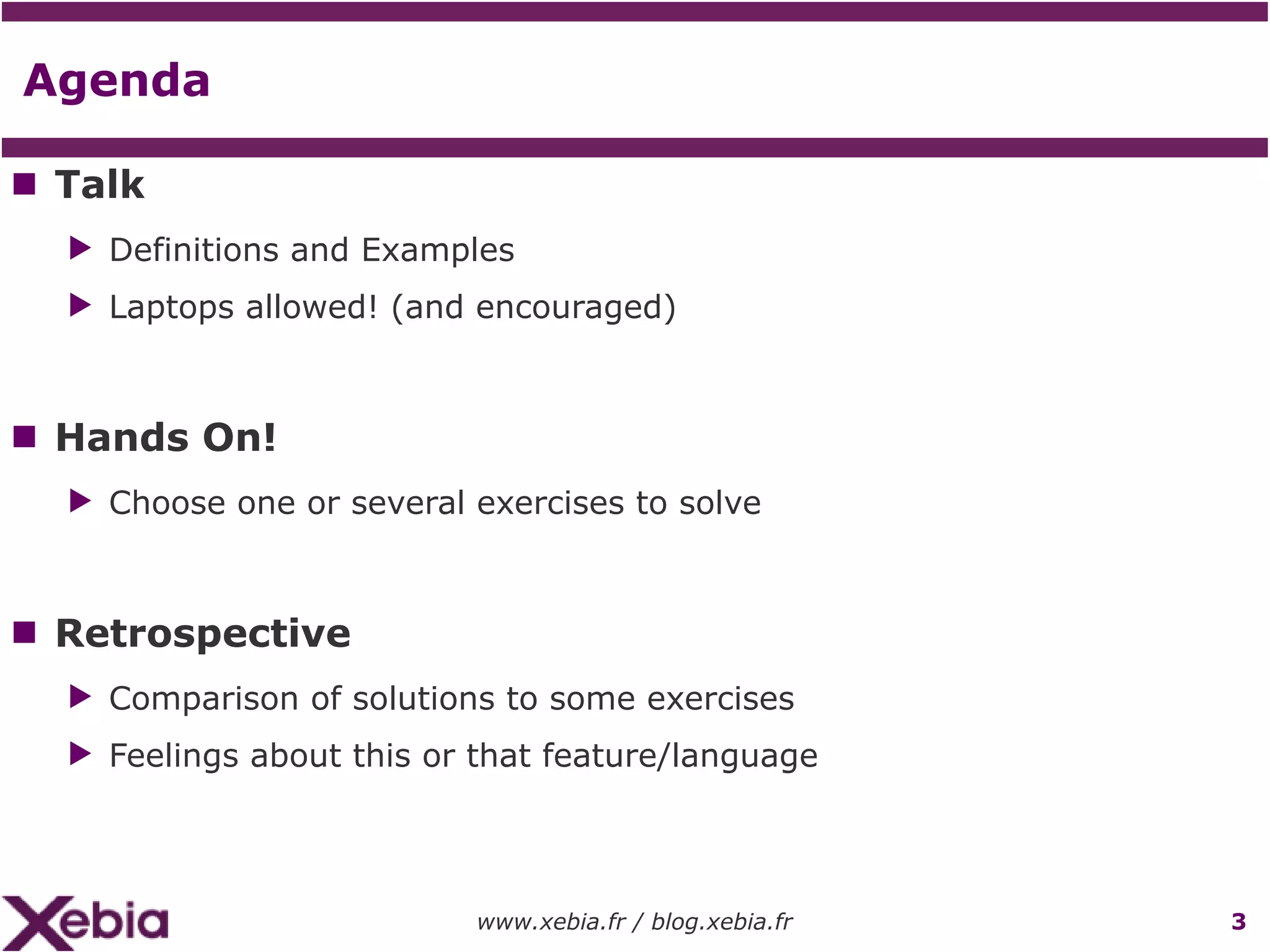
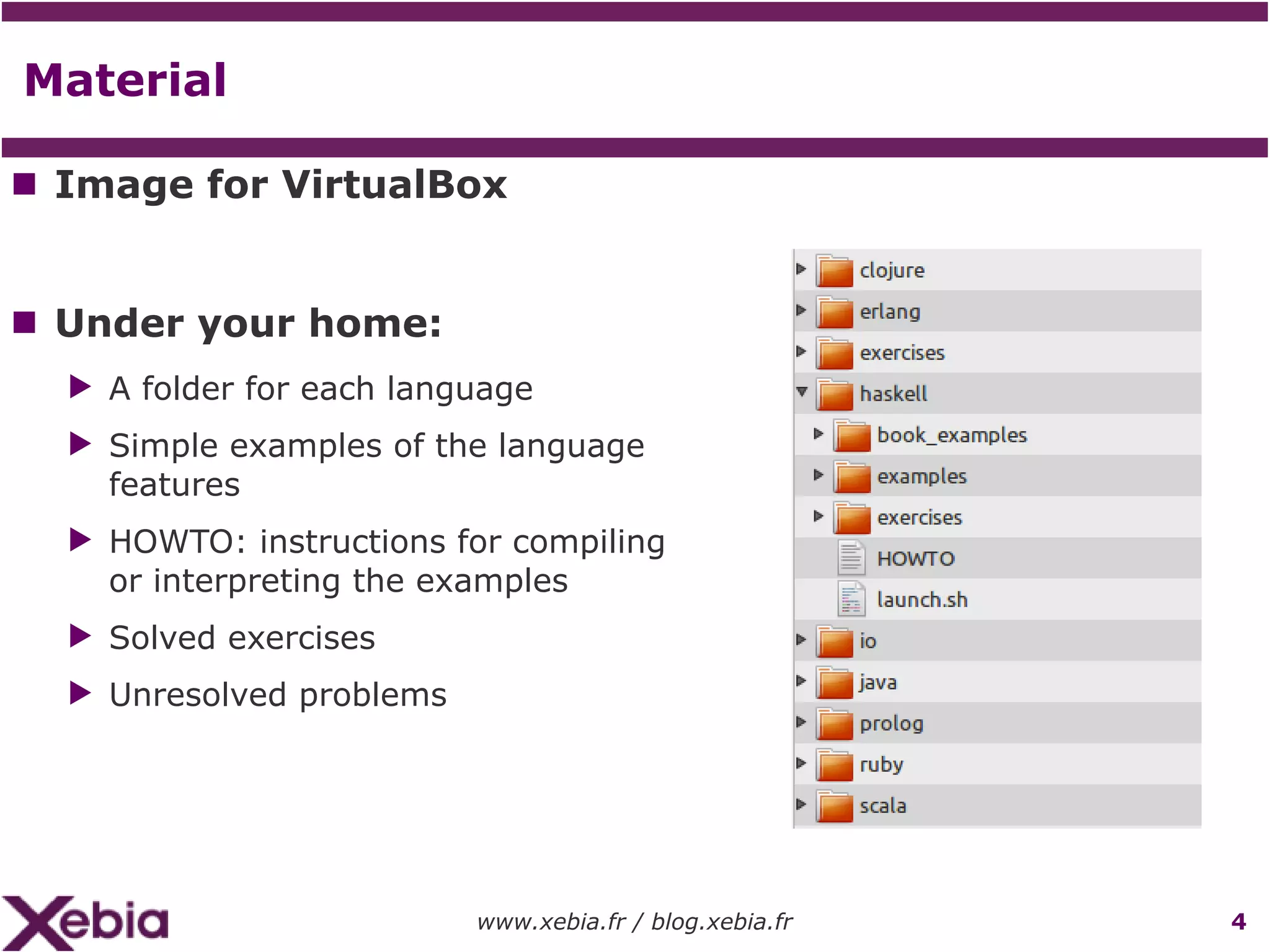
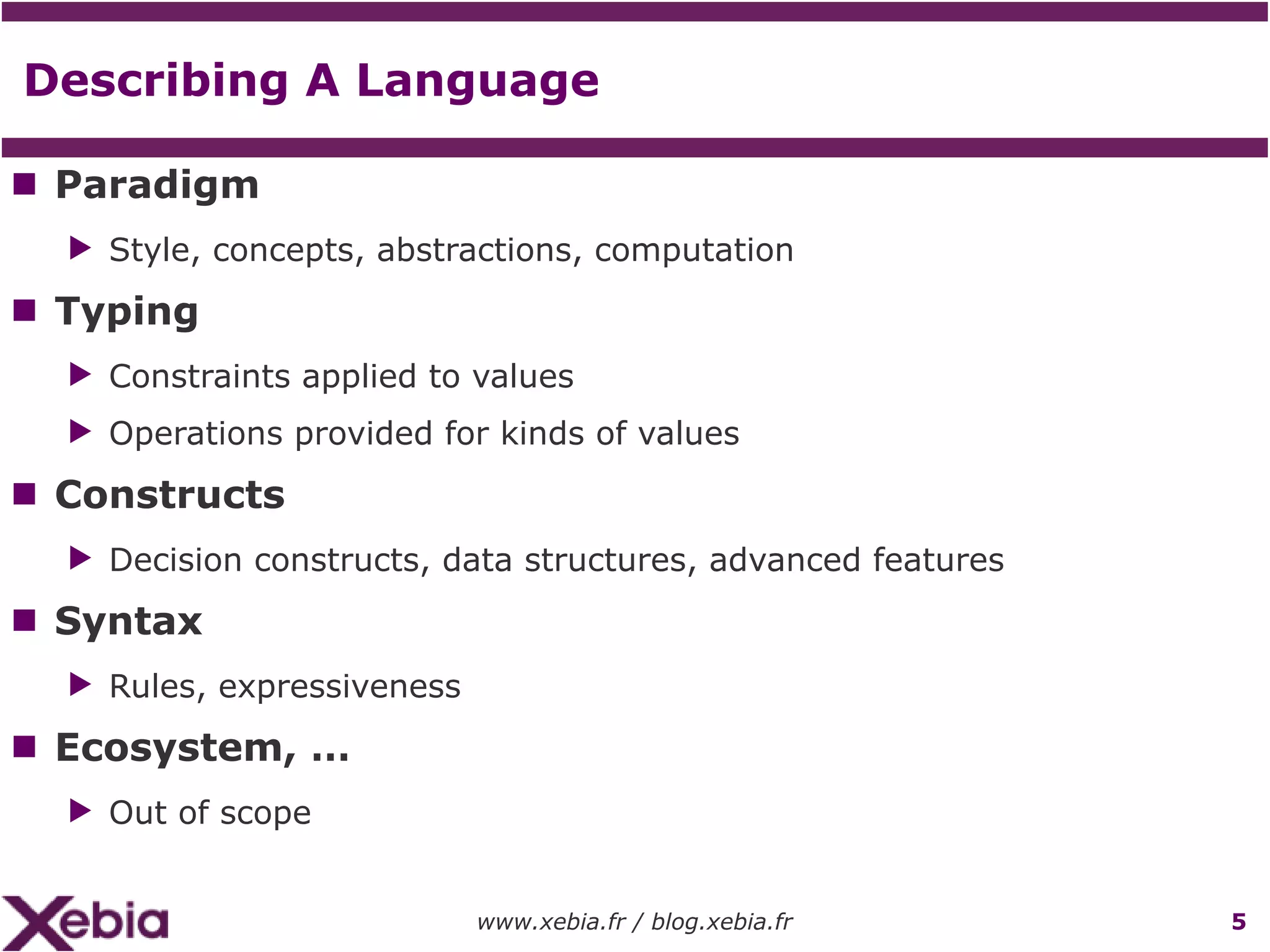
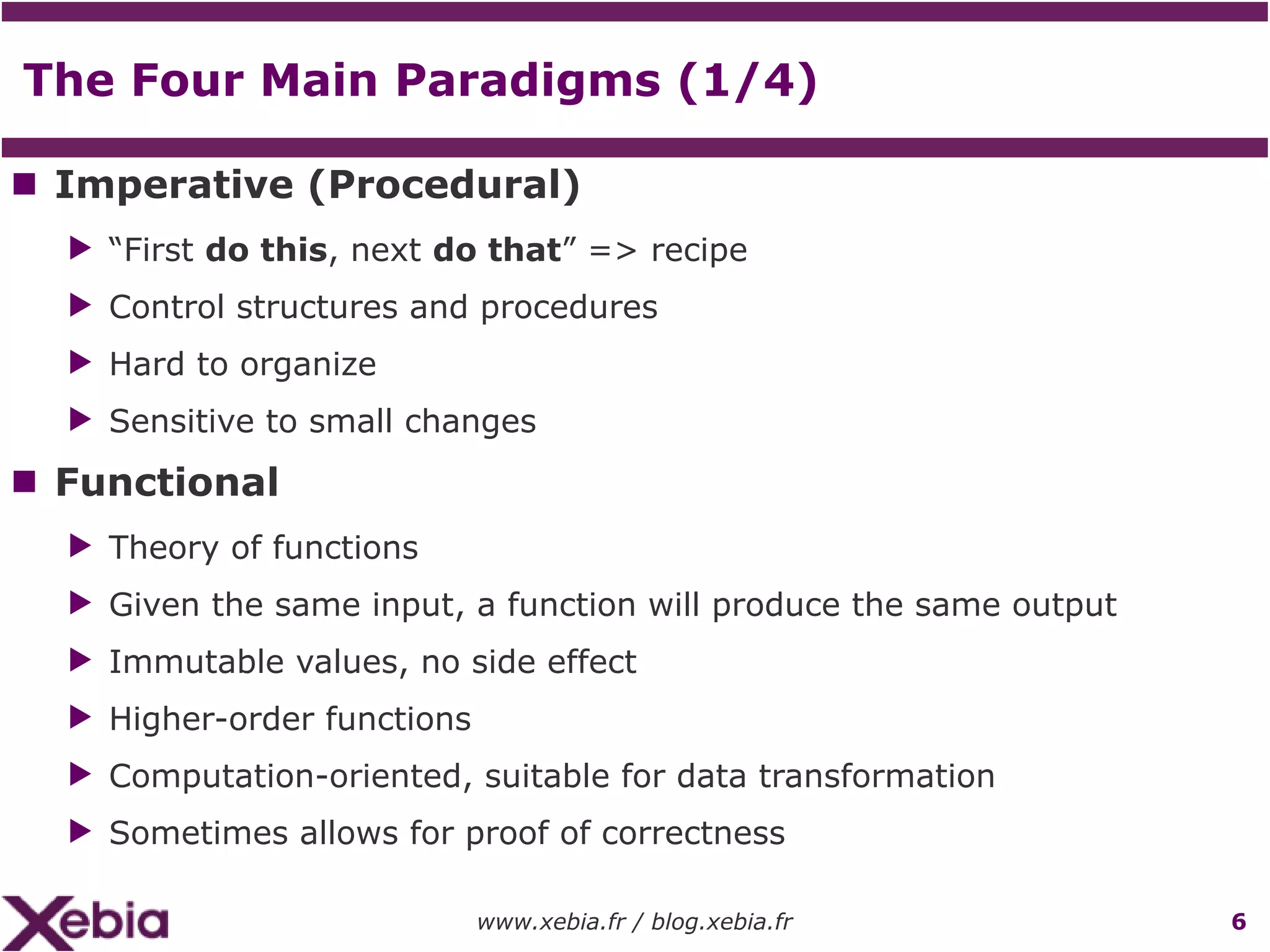
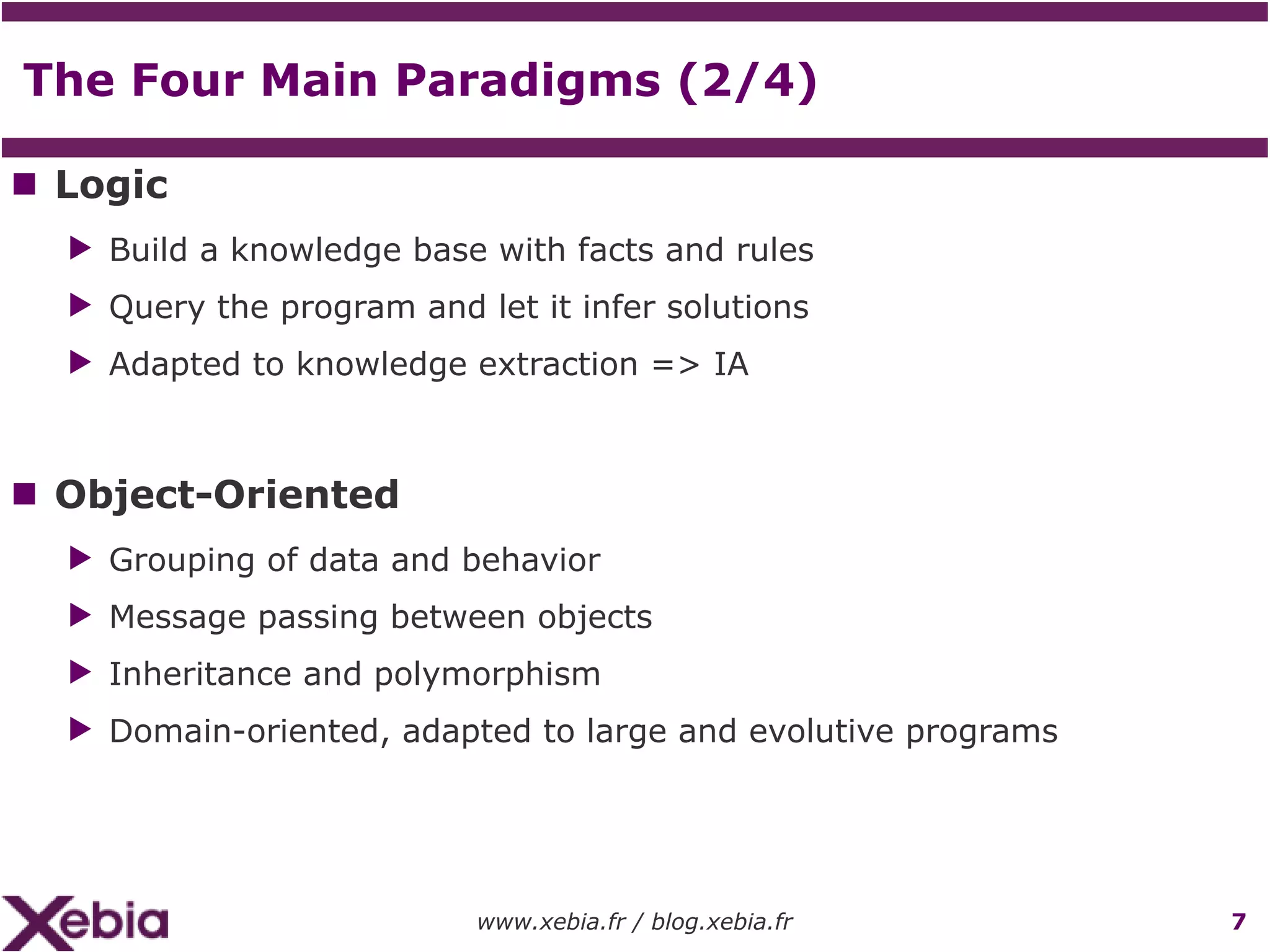
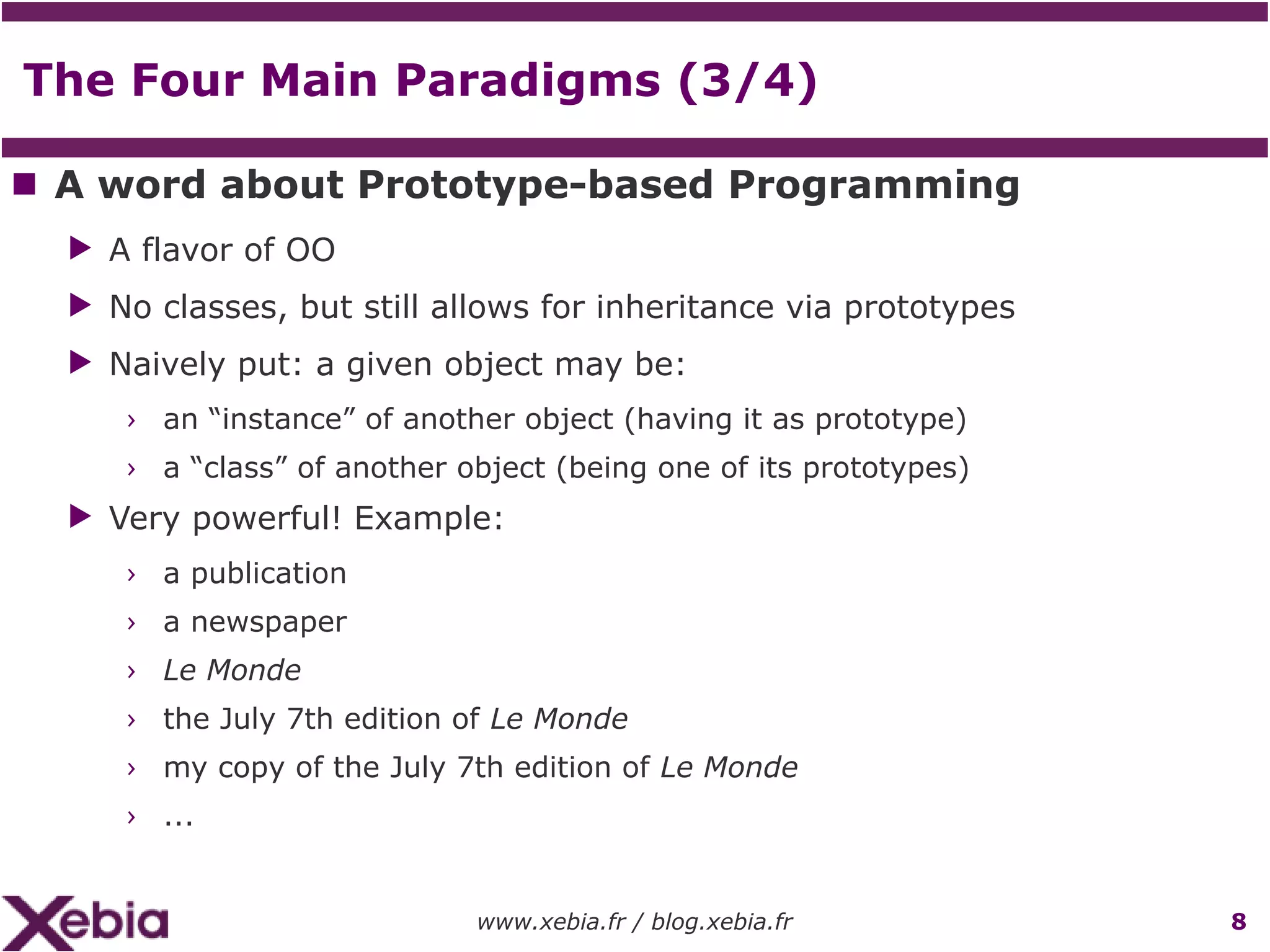
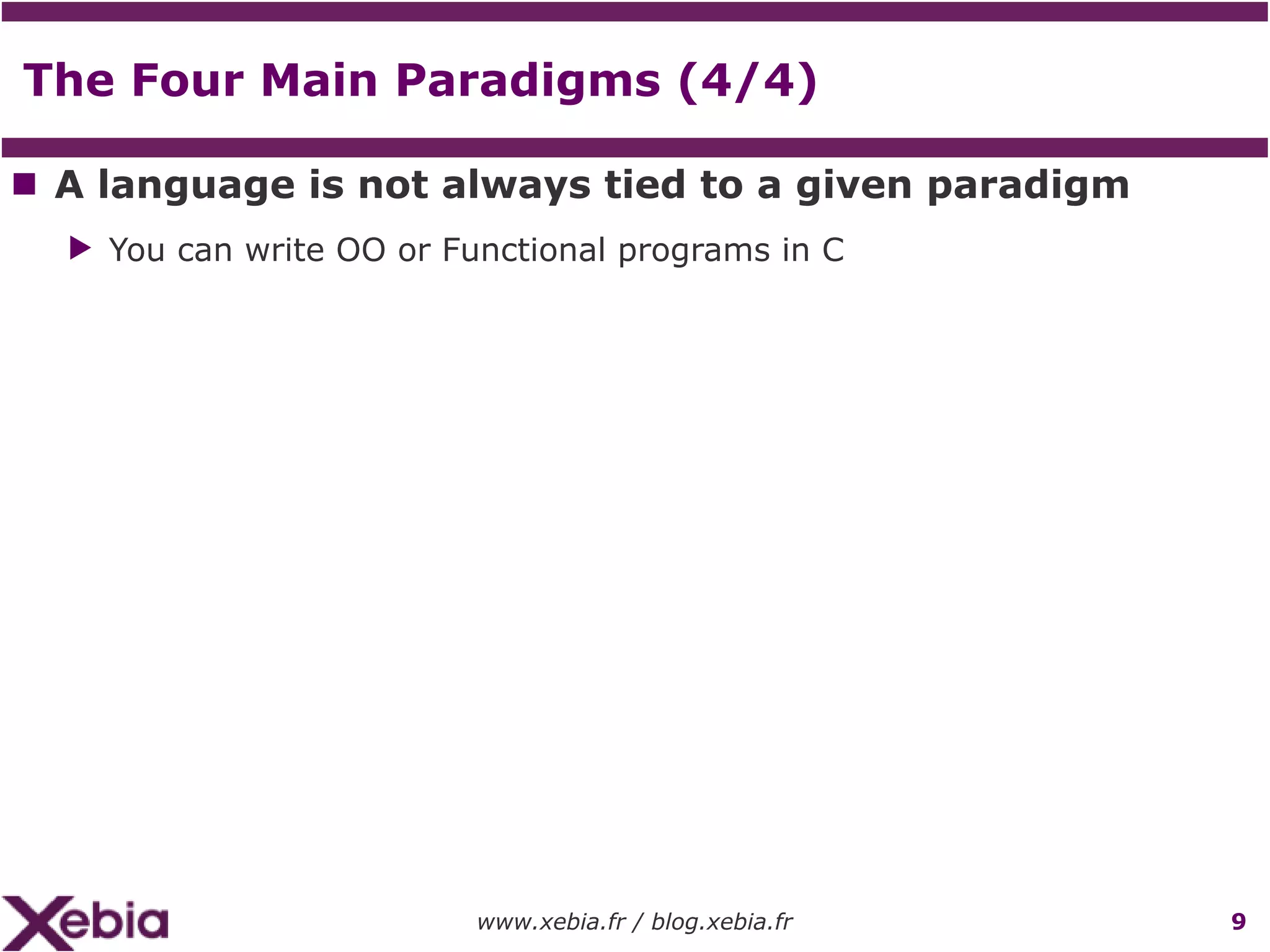
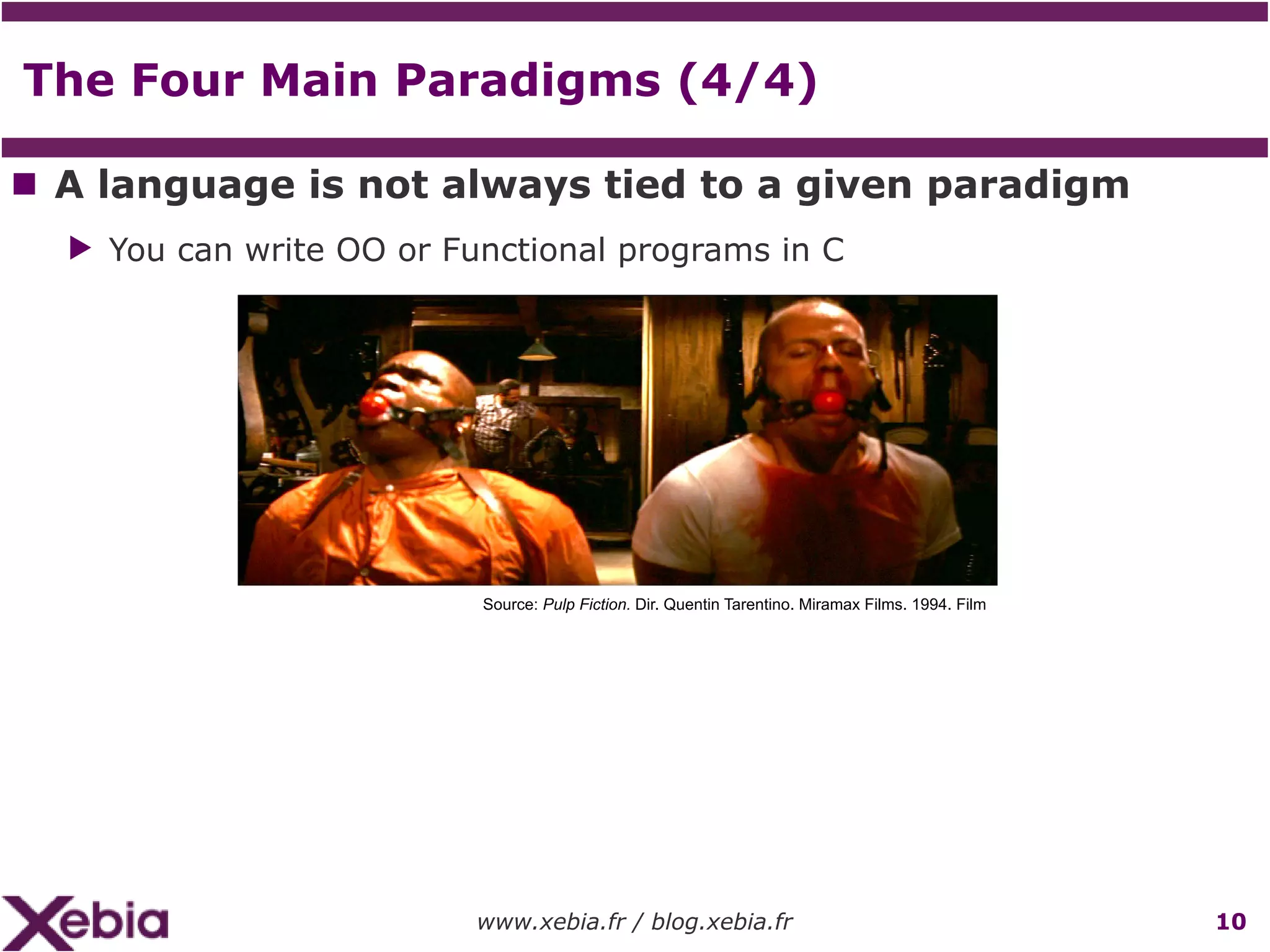
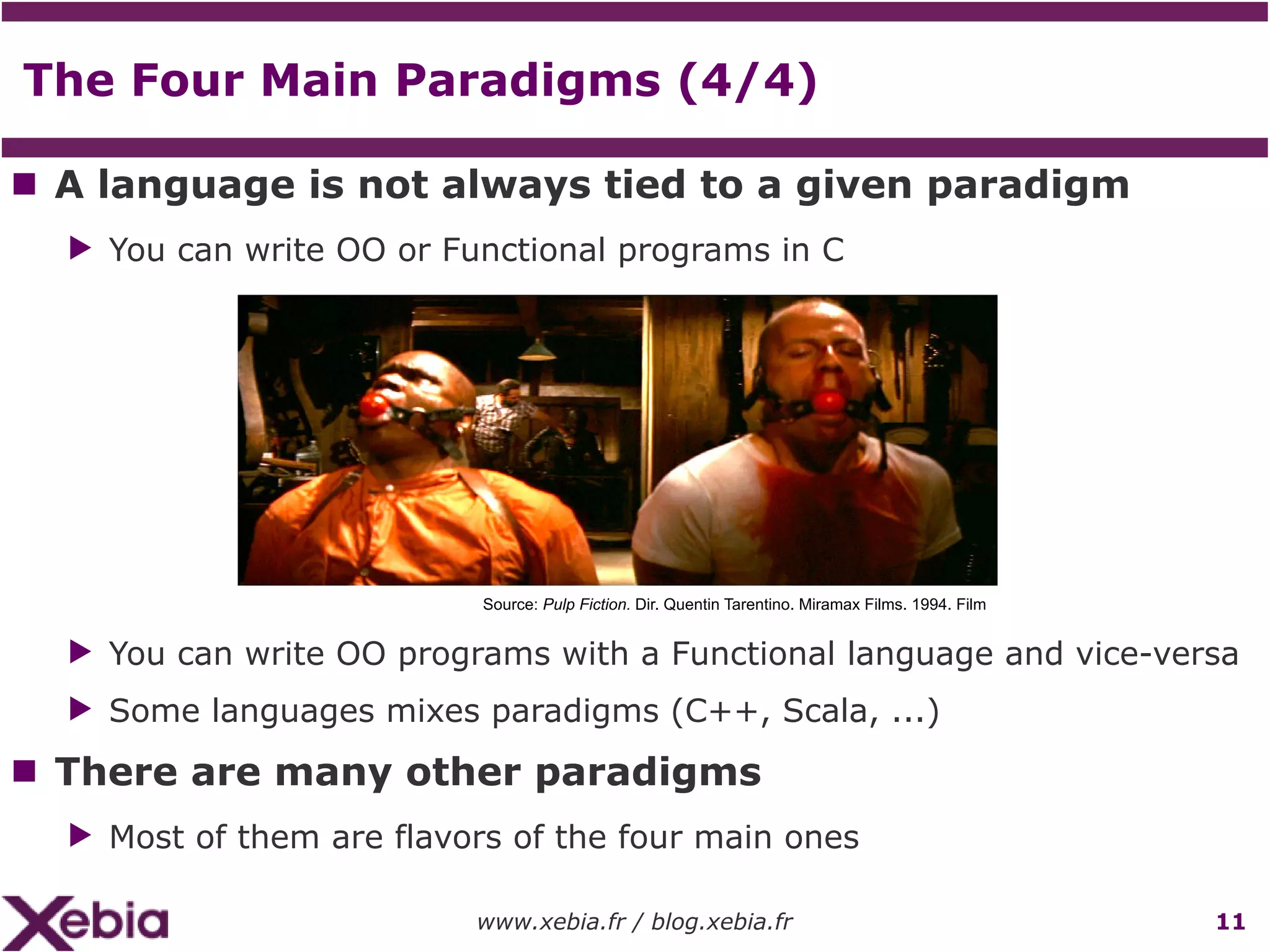
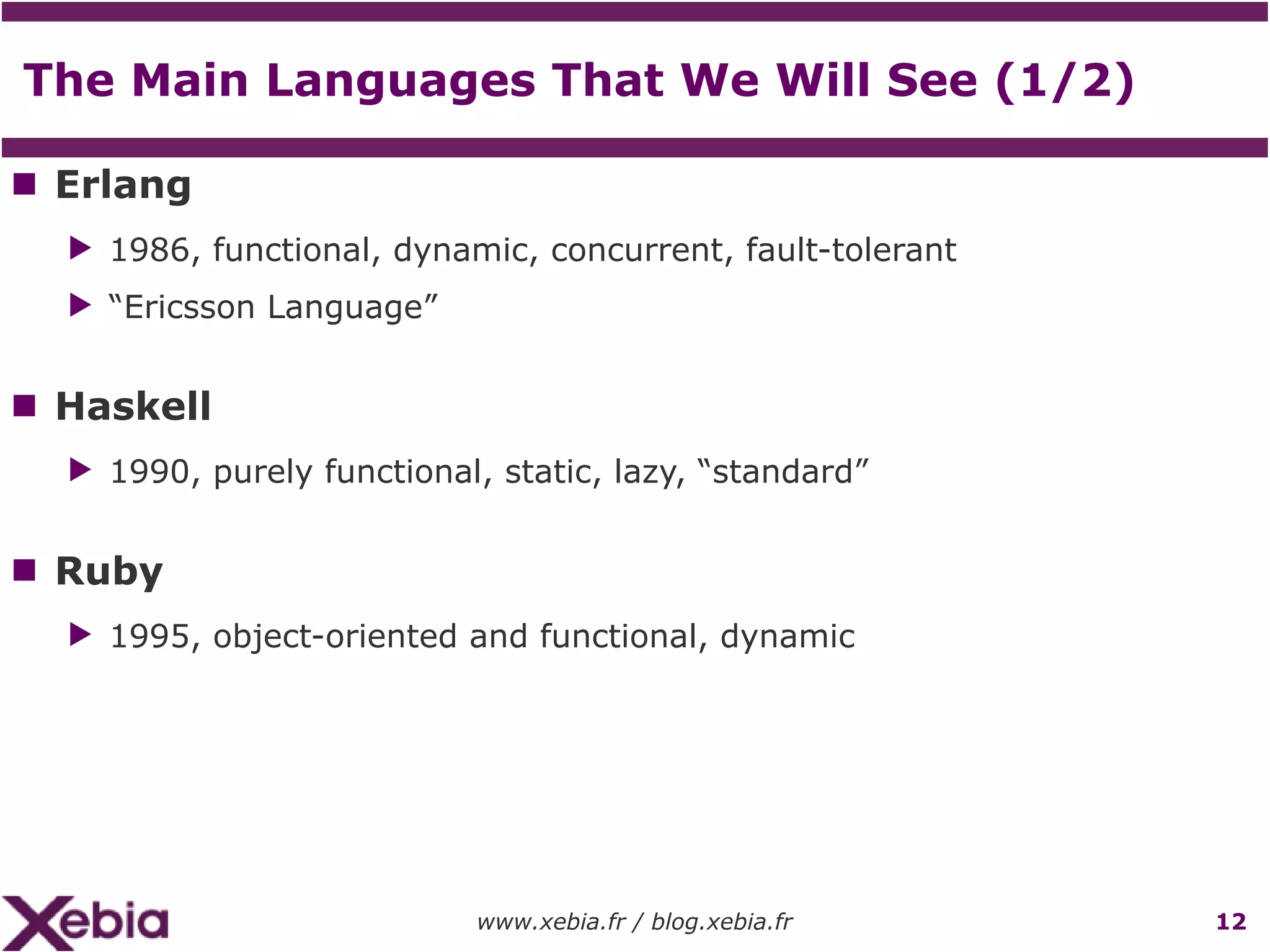
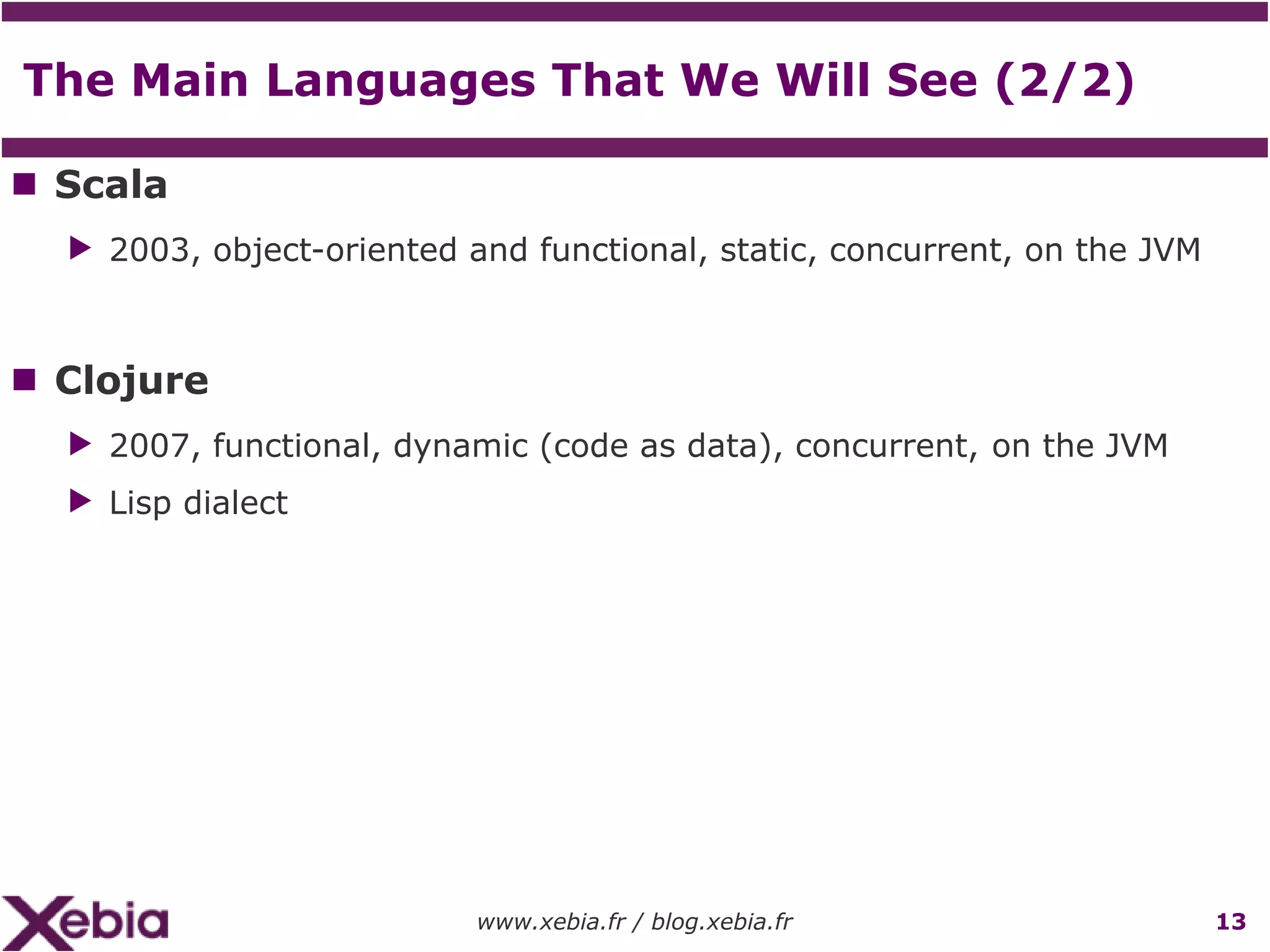
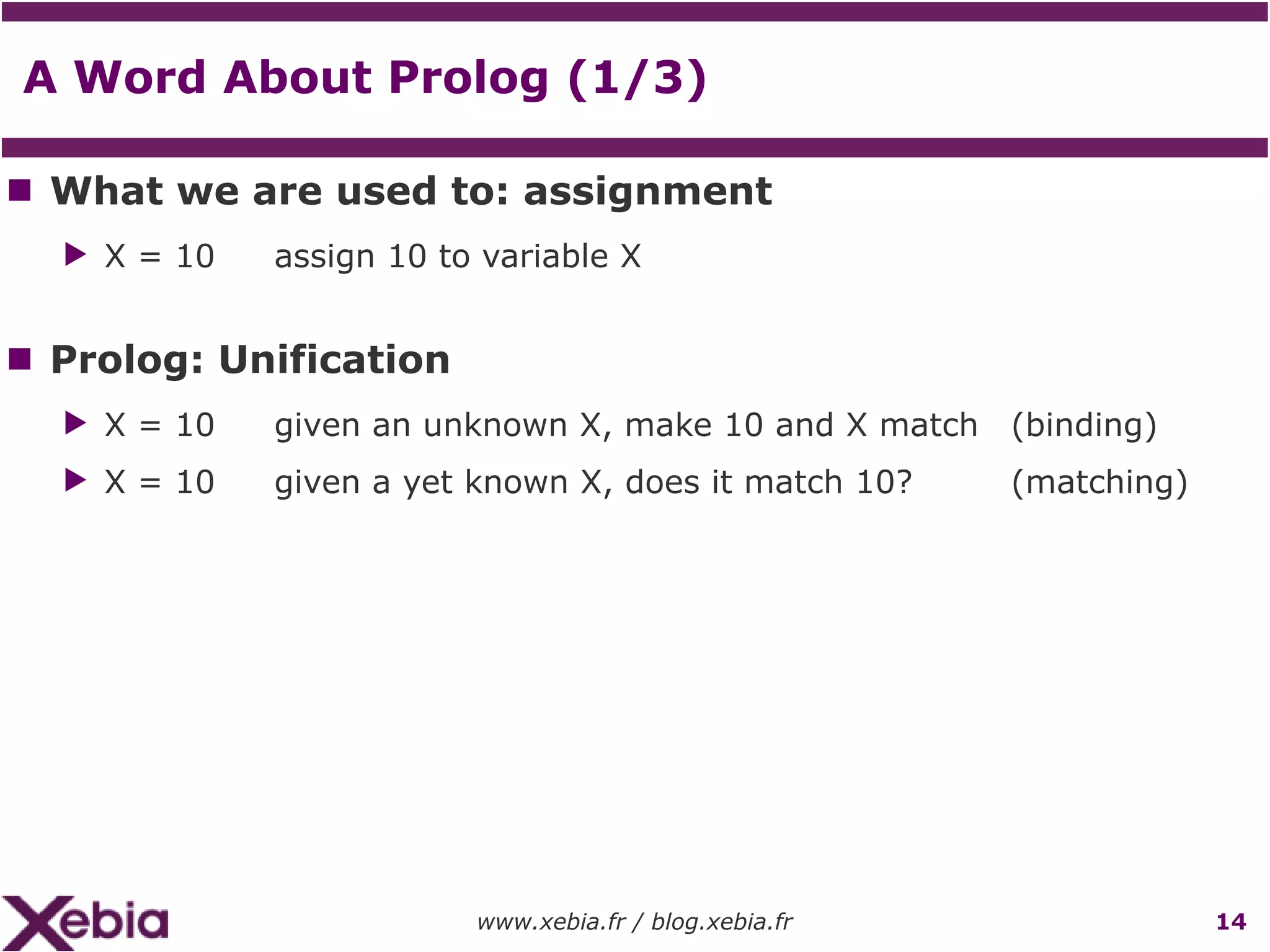
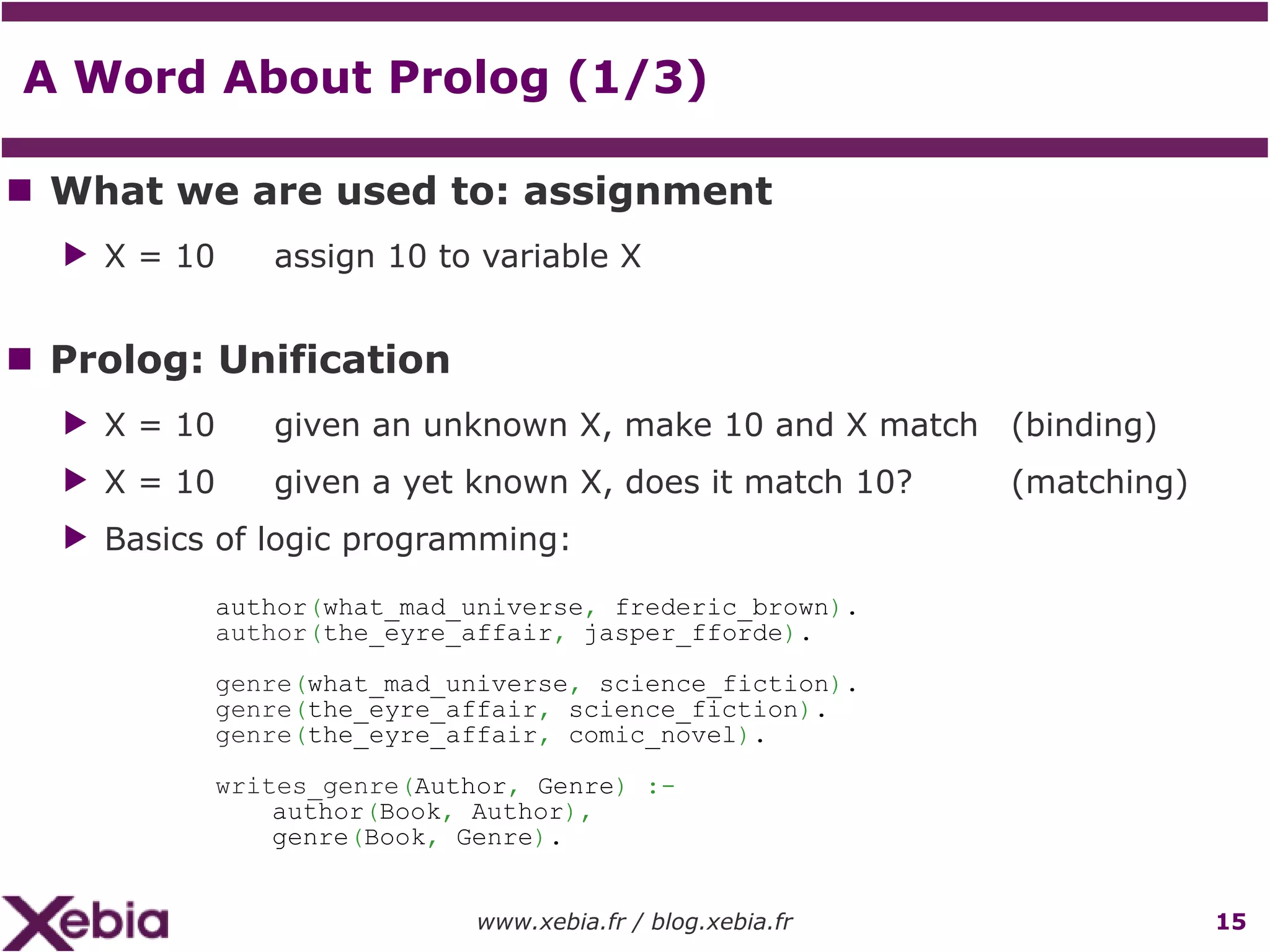
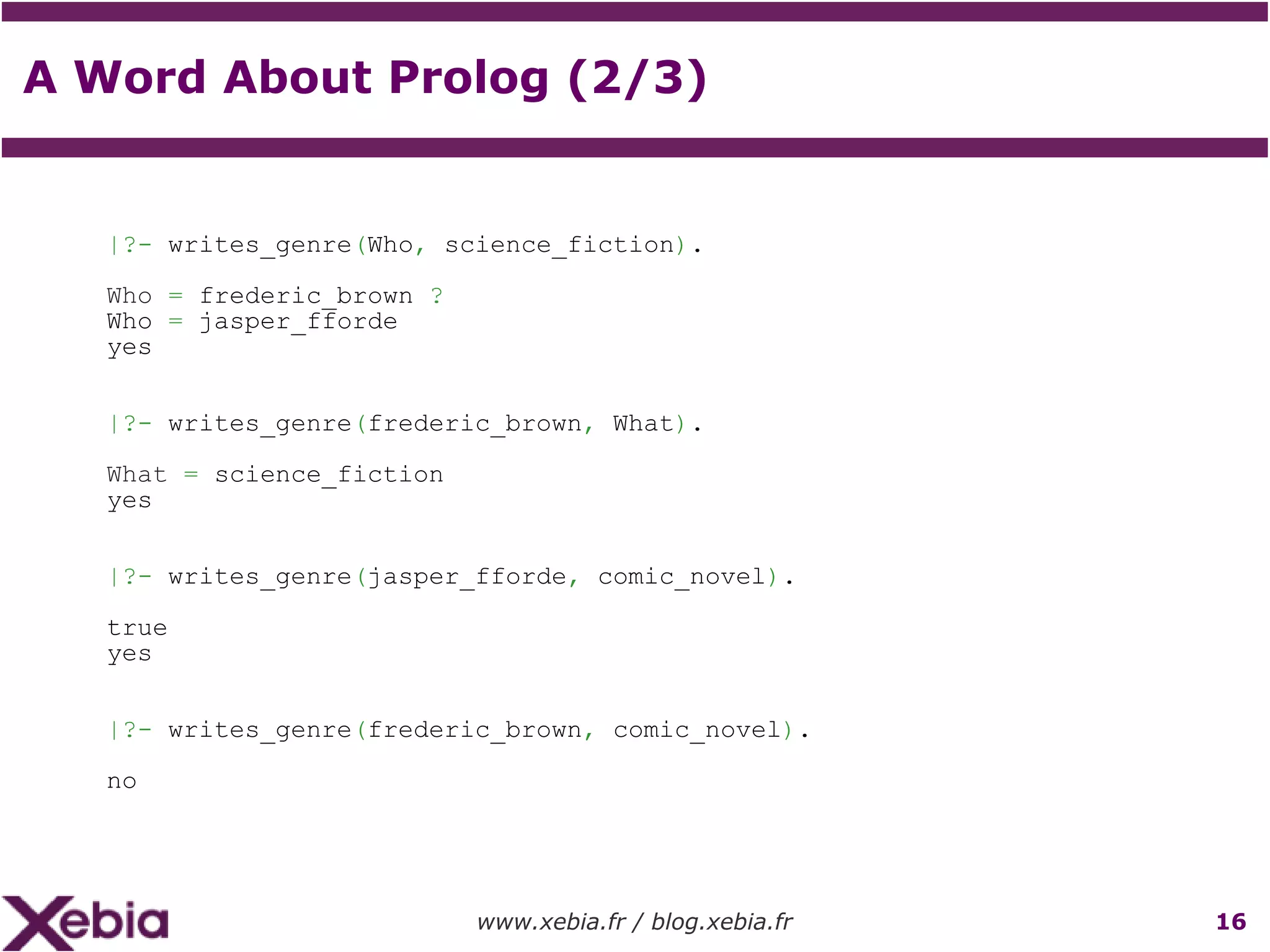
![A Word About Prolog (3/3) Pattern matching smallest([LonelyNumber], LonelyNumber). smallest([Head|Tail], SmallestSoFar) :- smallest(Tail, TailSmallest), SmallestSoFar is min(Head, TailSmallest). smallest([3, 1, 7], S). % S = 1 % more matching smallest([], -1). % empty list smallest(_, -1). % anything smallest([_|[SecondItem|_]], -1) :- SecondItem > 5, % guard % ... www.xebia.fr / blog.xebia.fr 17](https://image.slidesharecdn.com/prez-110918035657-phpapp01/75/XKE-Programming-Paradigms-Constructs-17-2048.jpg)
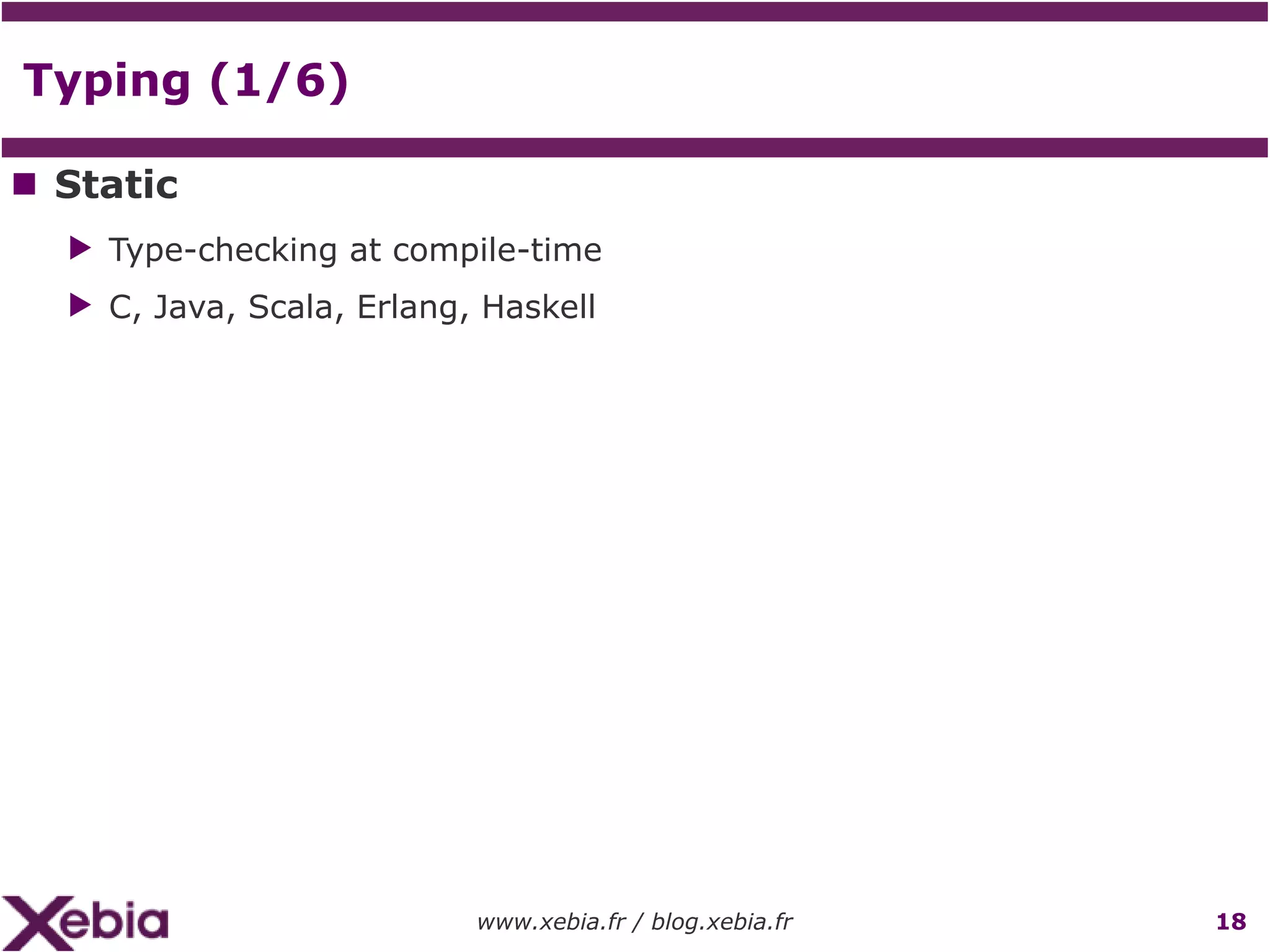
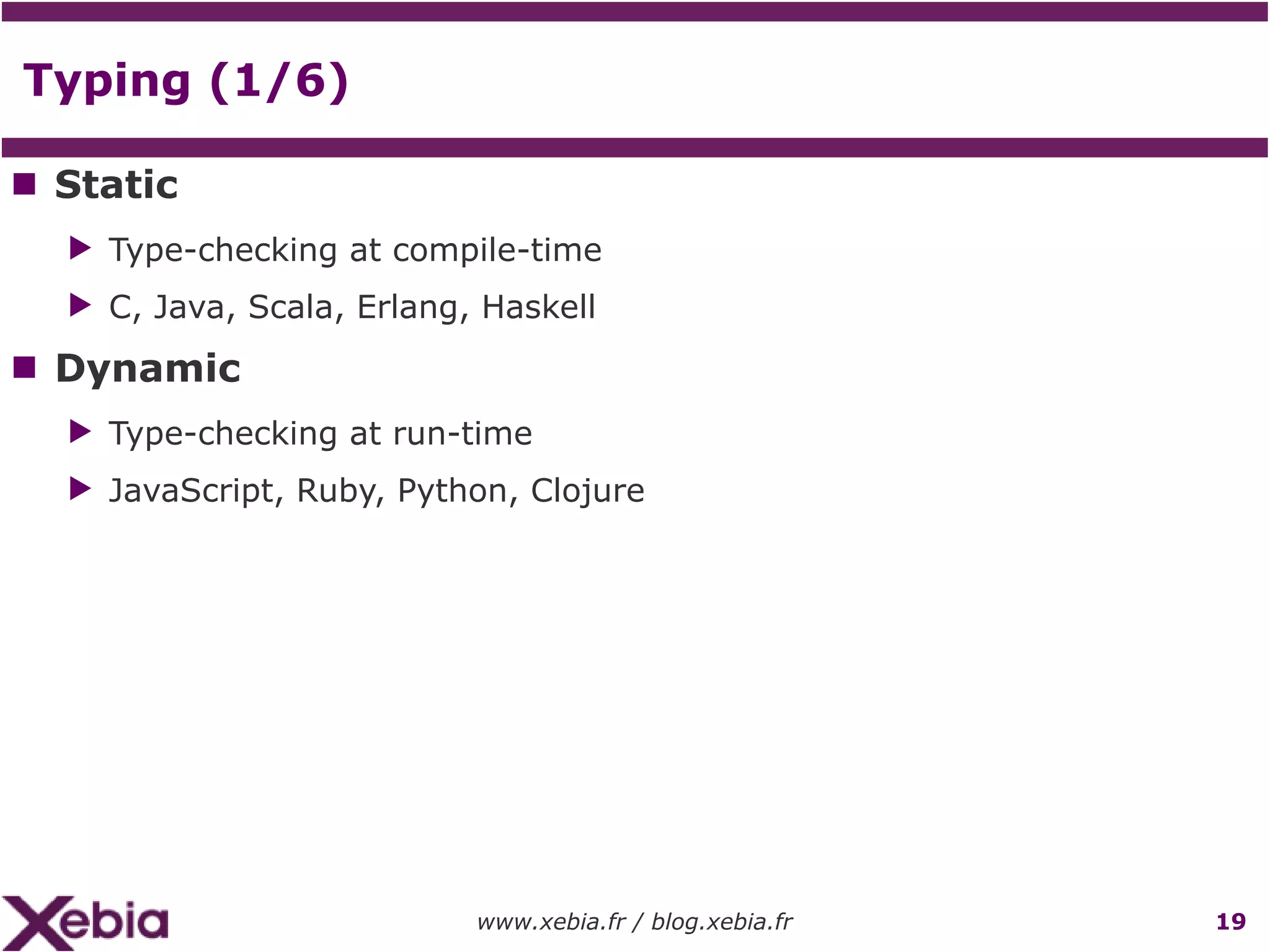
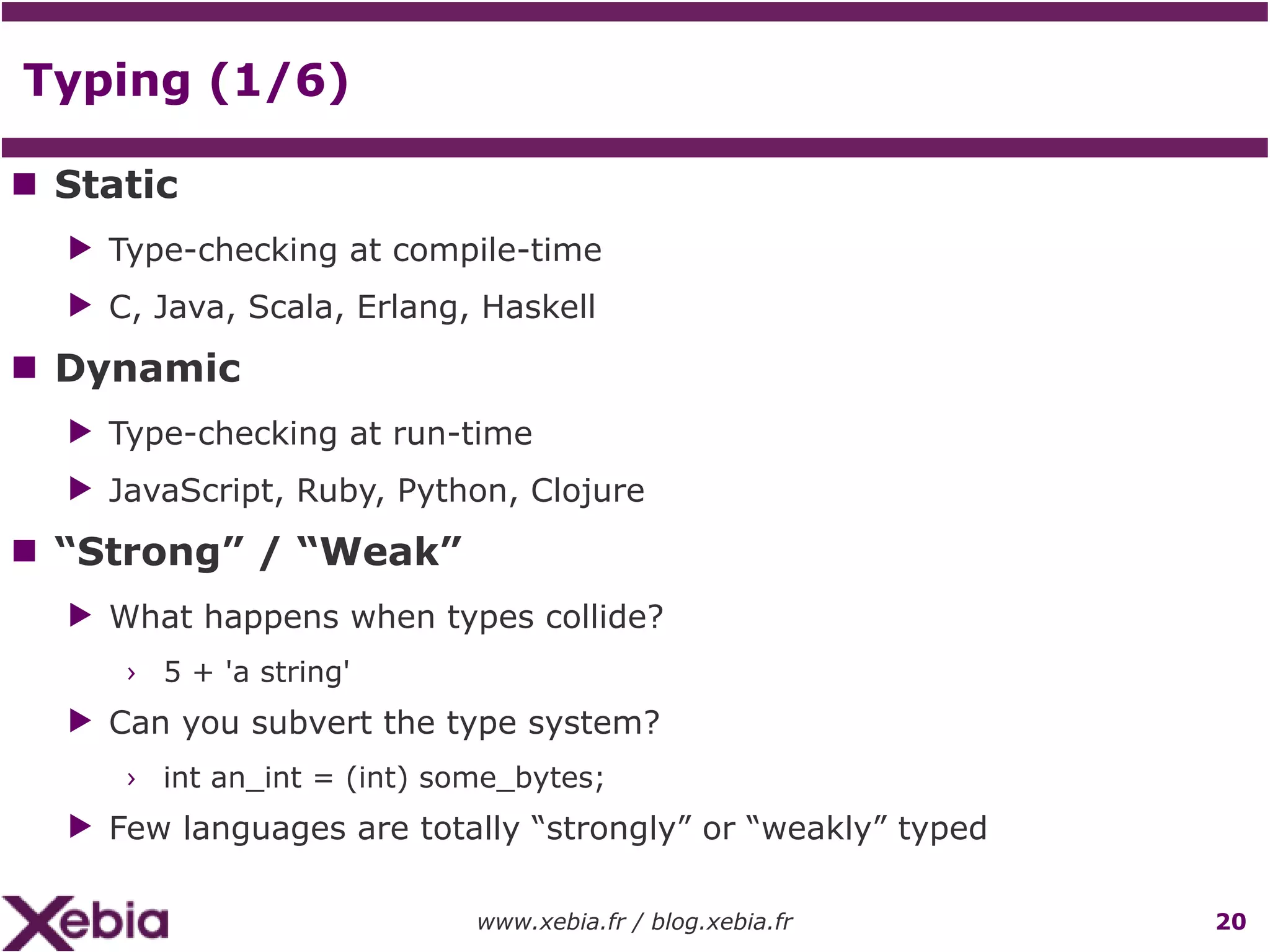
![Typing (2/6) Type Inference ▶ Deduction of the type of an expression at compile time ▶ Less boiler-plate code: eases writing and reading ▶ Haskell: double x = x * 2 -- (Num a) => a -> a double :: Integer -> Integer double x = x * 2 -- Integer -> Integer ▶ Scala: val ints = List(1, 2, 3) // List[Int] def addNumbers(first: Int, second: Int) = first + second // equivalent to def addNumbers(first: Int, second: Int): Int = first + second www.xebia.fr / blog.xebia.fr 21](https://image.slidesharecdn.com/prez-110918035657-phpapp01/75/XKE-Programming-Paradigms-Constructs-21-2048.jpg)
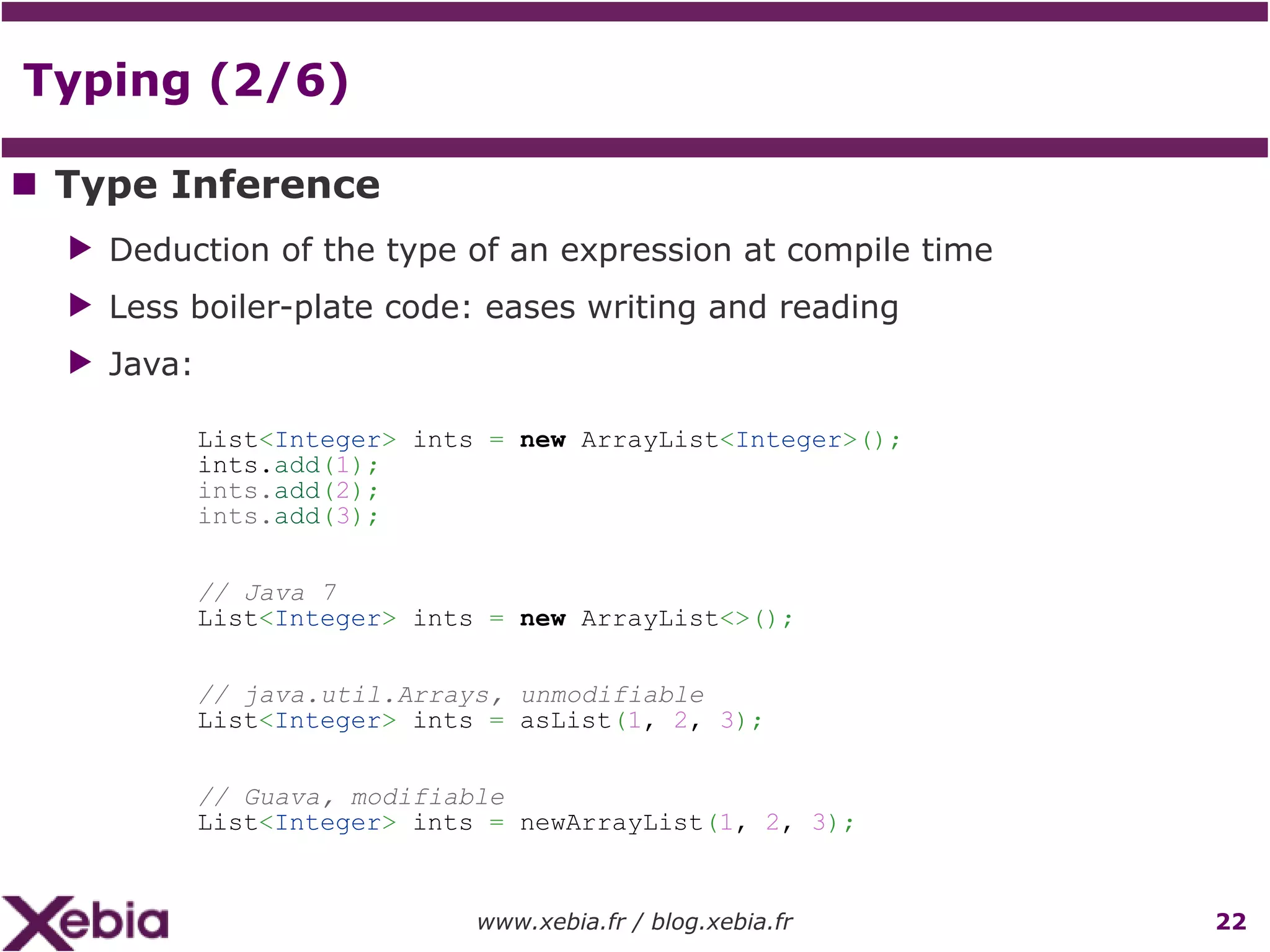
![Typing (3/6) Duck Typing ▶ Example (JS): var car = { startEngine: function() { /* vroom */ } } var blender = { startEngine: function() { /* ouch my fingers! */ } } var thingsWithEngine = [car, blender]; for (thing in thingsWithEngine) { thing.startEngine(); } ▶ If it walks like a duck and quacks like a duck, it’s a duck. www.xebia.fr / blog.xebia.fr 23](https://image.slidesharecdn.com/prez-110918035657-phpapp01/75/XKE-Programming-Paradigms-Constructs-23-2048.jpg)
![Typing (3/6) Duck Typing ▶ Example (JS): var car = { startEngine: function() { /* vroom */ } } var blender = { startEngine: function() { /* ouch my fingers! */ } } var thingsWithEngine = [car, blender]; for (thing in thingsWithEngine) { thing.startEngine(); } ▶ If it walks like a duck and quacks like a duck, it’s a duck. And if it weighs the same as a duck... www.xebia.fr / blog.xebia.fr 24](https://image.slidesharecdn.com/prez-110918035657-phpapp01/75/XKE-Programming-Paradigms-Constructs-24-2048.jpg)
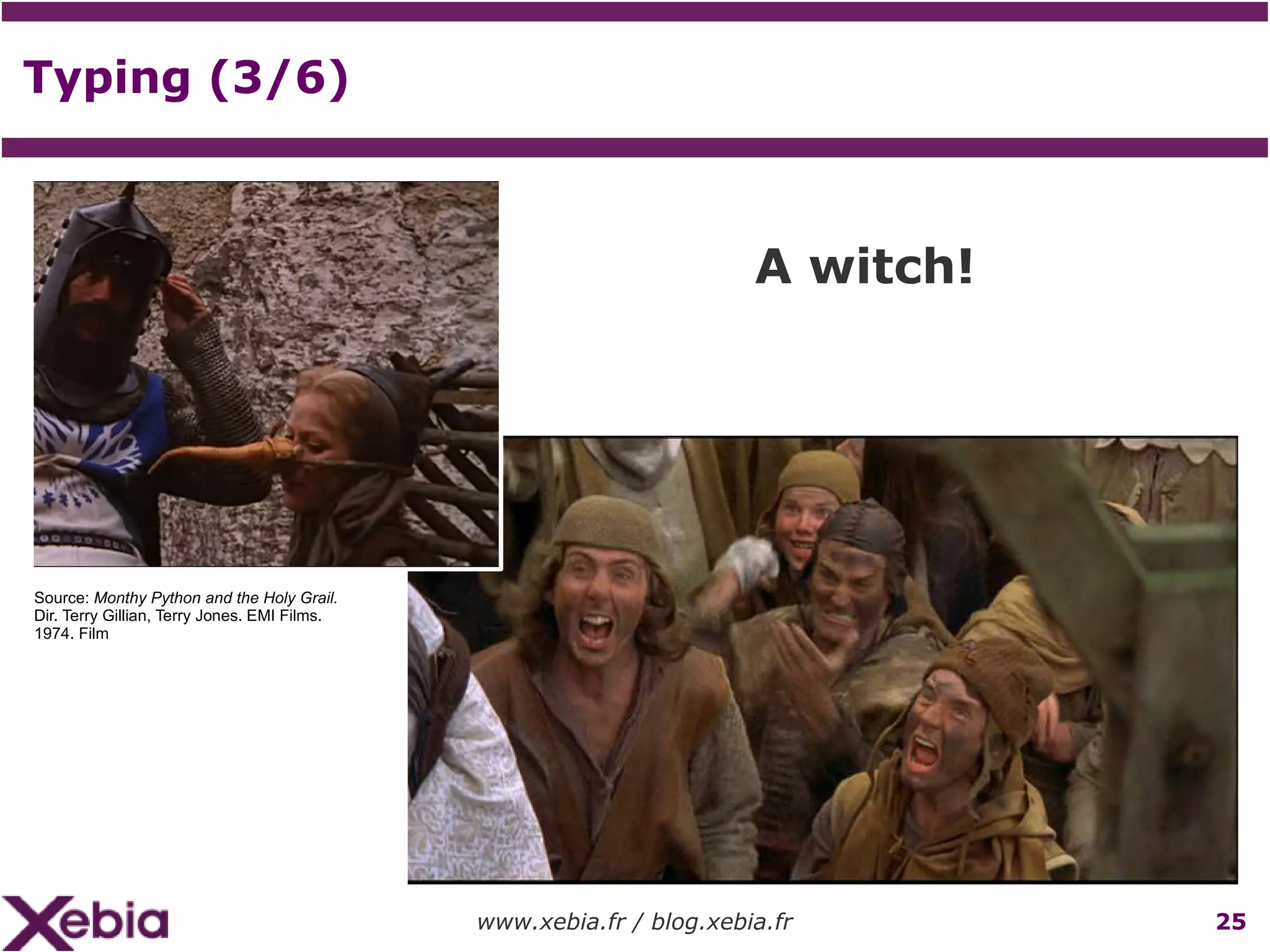
, new Blender()) thingsWithEngine.foreach(_.startEngine) www.xebia.fr / blog.xebia.fr 26](https://image.slidesharecdn.com/prez-110918035657-phpapp01/75/XKE-Programming-Paradigms-Constructs-26-2048.jpg)
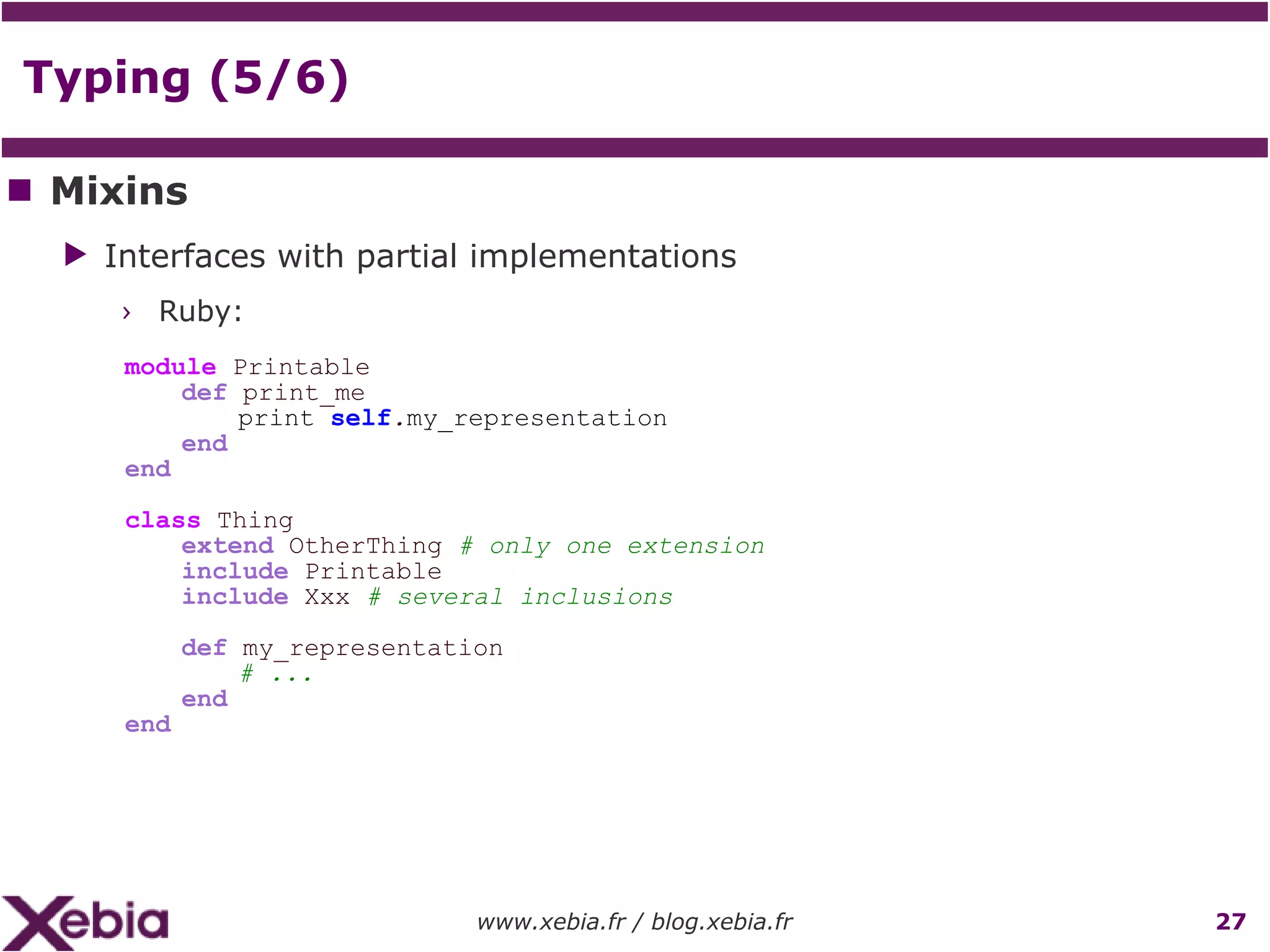
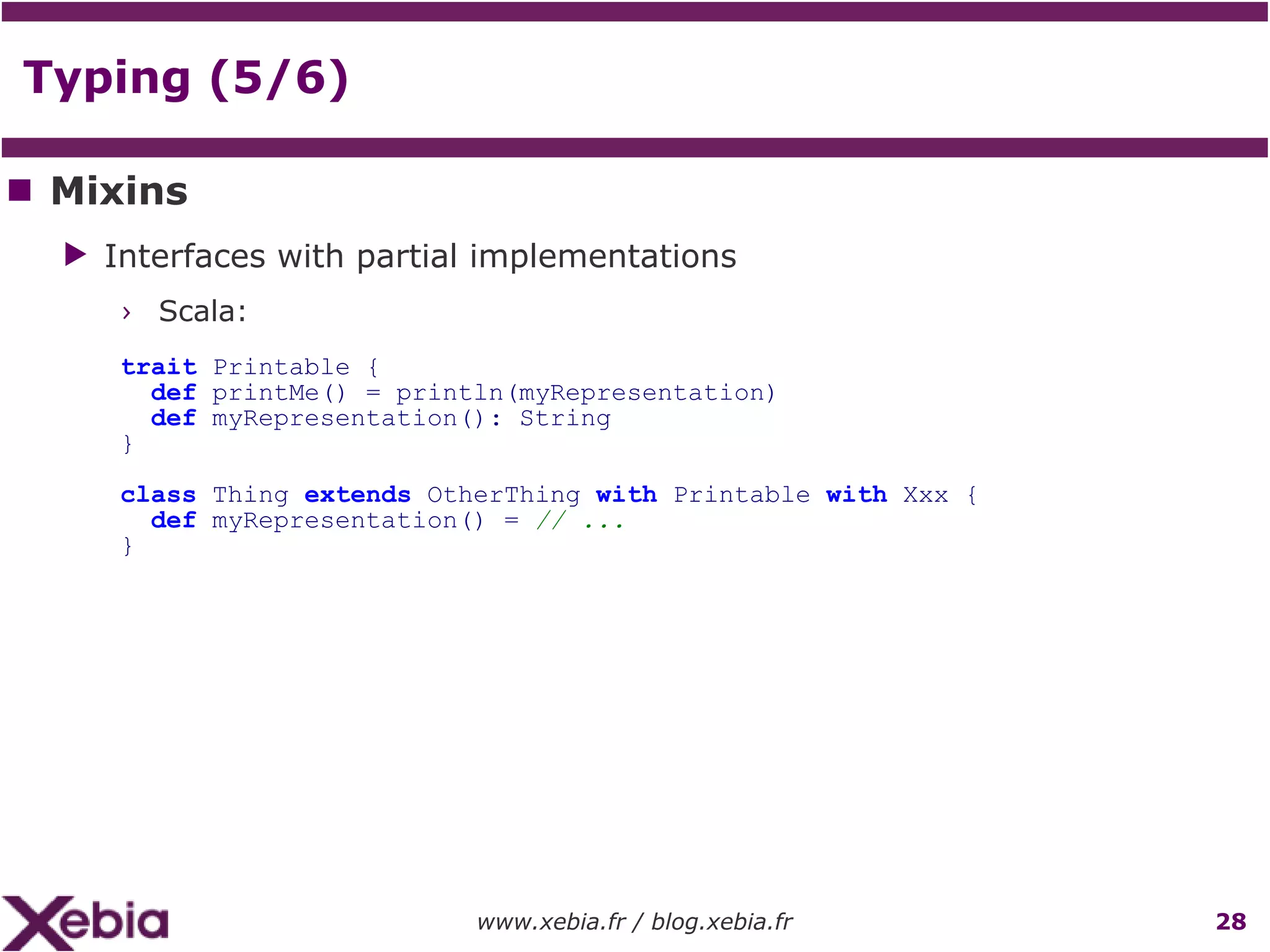
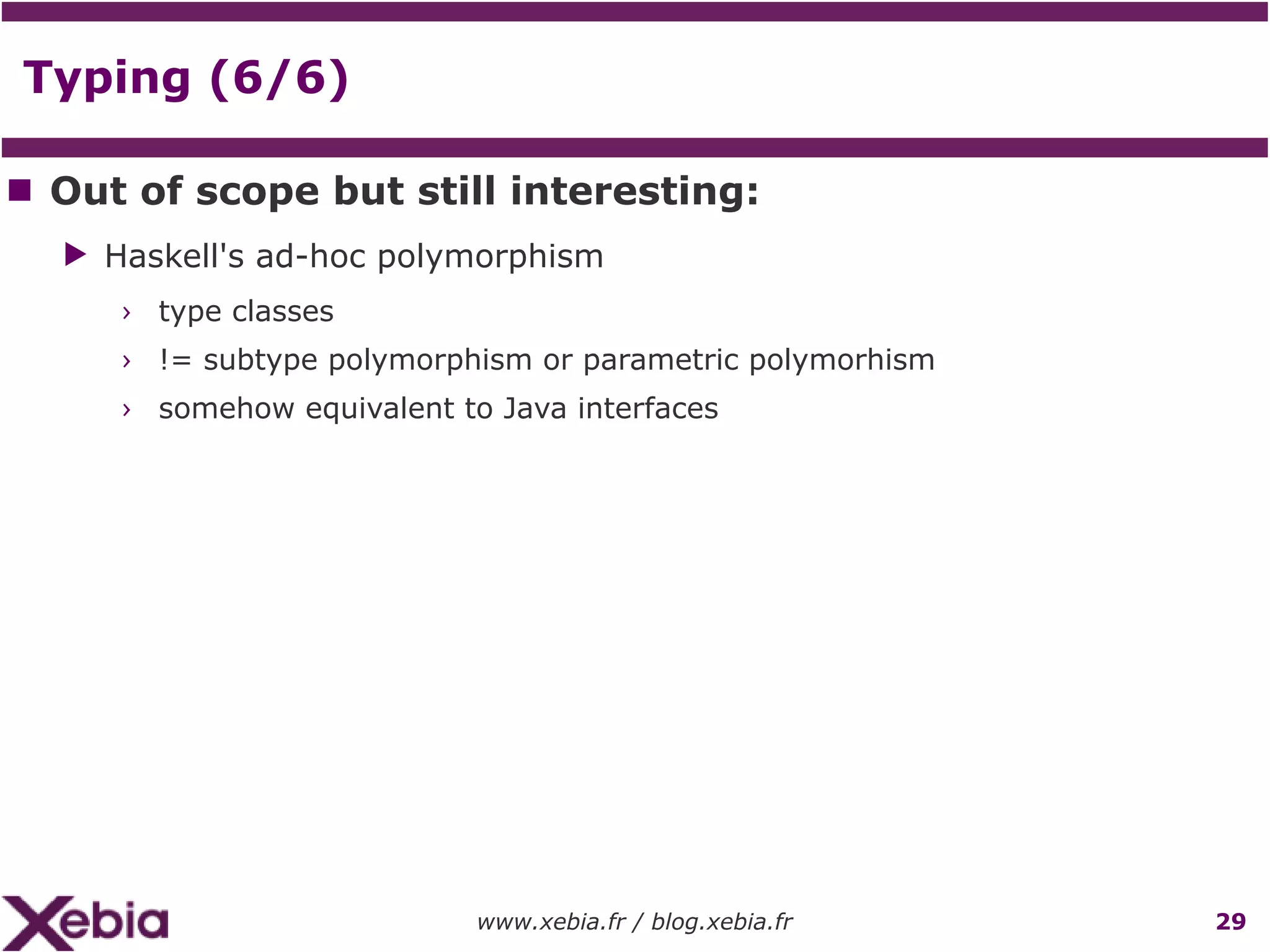
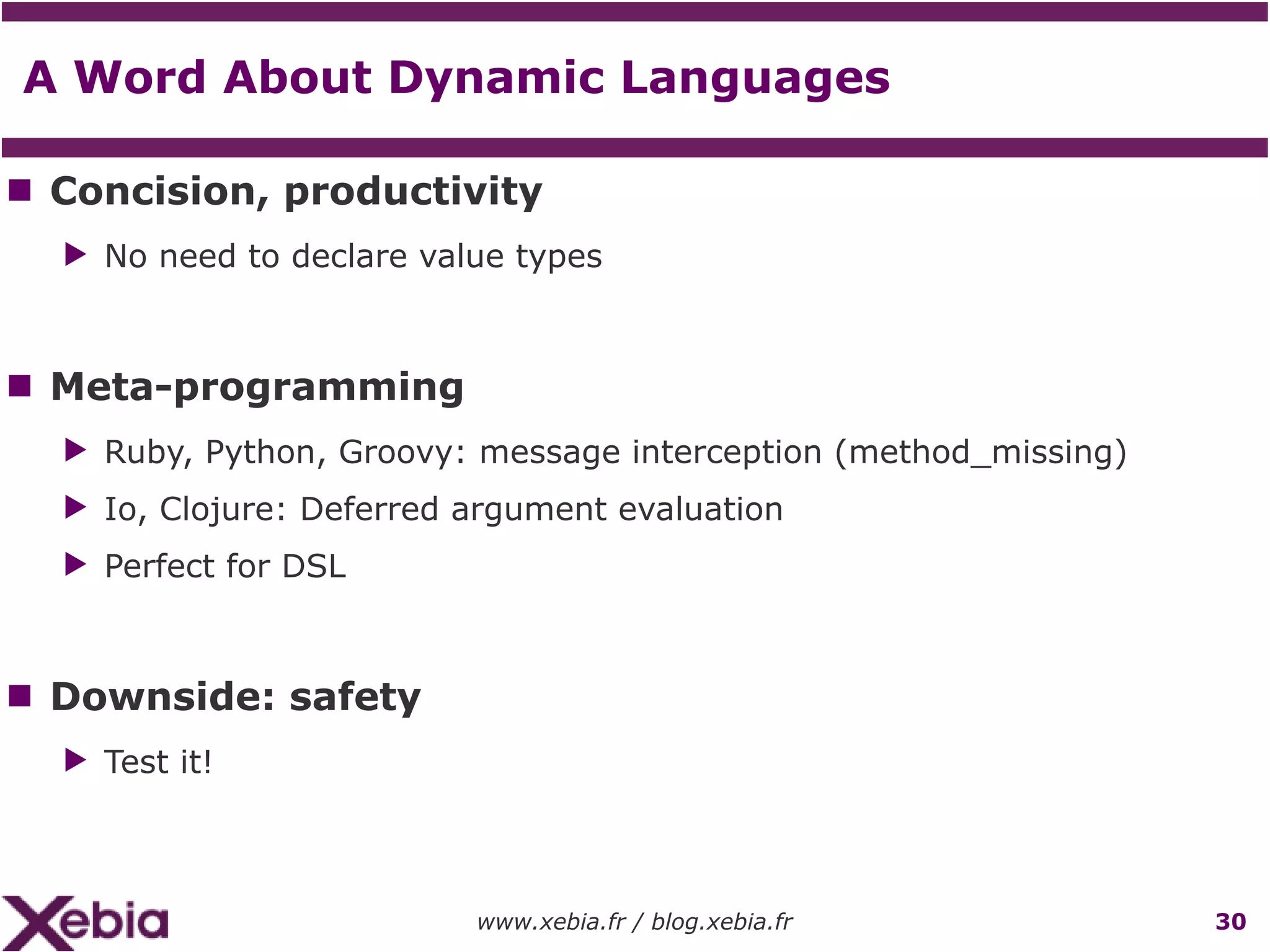
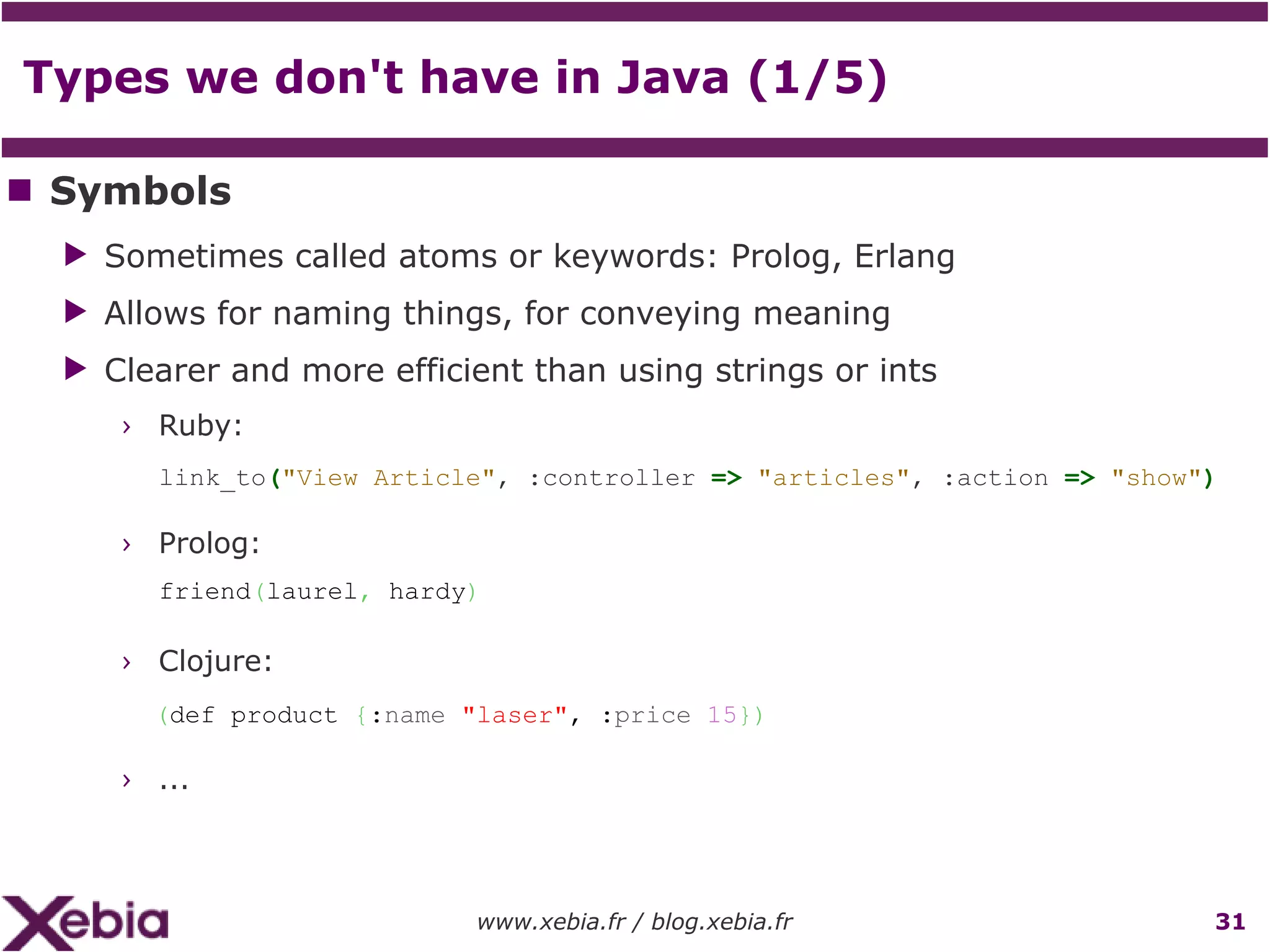
![Types we don't have in Java (2/5) Regex ▶ Scala: val line = """Completed in 100ms (View: 25, DB: 75) | 200 OK [http://example.com?params=here]""" val LogEntry = """Completed in (d+)ms (View: (d+), DB: (d+)) | (d+) OK [http://example.com(.*)?.*""".r www.xebia.fr / blog.xebia.fr 32](https://image.slidesharecdn.com/prez-110918035657-phpapp01/75/XKE-Programming-Paradigms-Constructs-32-2048.jpg)
![Types we don't have in Java (2/5) Regex ▶ Scala: val line = """Completed in 100ms (View: 25, DB: 75) | 200 OK [http://example.com?params=here]""" val LogEntry = """Completed in (d+)ms (View: (d+), DB: (d+)) | (d+) OK [http://example.com(.*)?.*""".r val LogEntry(totalTime, viewTime, dbTime, responseCode, uri) = line // result totalTime: String = 100 viewTime: String = 25 dbTime: String = 75 responseCode: String = 200 uri: String = "" www.xebia.fr / blog.xebia.fr 33](https://image.slidesharecdn.com/prez-110918035657-phpapp01/75/XKE-Programming-Paradigms-Constructs-33-2048.jpg)
![Types we don't have in Java (2/5) Regex ▶ Scala: val line = """Completed in 100ms (View: 25, DB: 75) | 200 OK [http://example.com?params=here]""" val LogEntry = """Completed in (d+)ms (View: (d+), DB: (d+)) | (d+) OK [http://example.com(.*)?.*""".r val LogEntry(totalTime, viewTime, dbTime, responseCode, uri) = line // result totalTime: String = 100 viewTime: String = 25 dbTime: String = 75 responseCode: String = 200 uri: String = "" Source.fromFile(logFile).getLines.collect { _ match { case LogEntry(tt, vt, dbt, rc, uri) => println(rc) case OtherPattern(var1, var2) => // … case _ => } } www.xebia.fr / blog.xebia.fr 34](https://image.slidesharecdn.com/prez-110918035657-phpapp01/75/XKE-Programming-Paradigms-Constructs-34-2048.jpg)
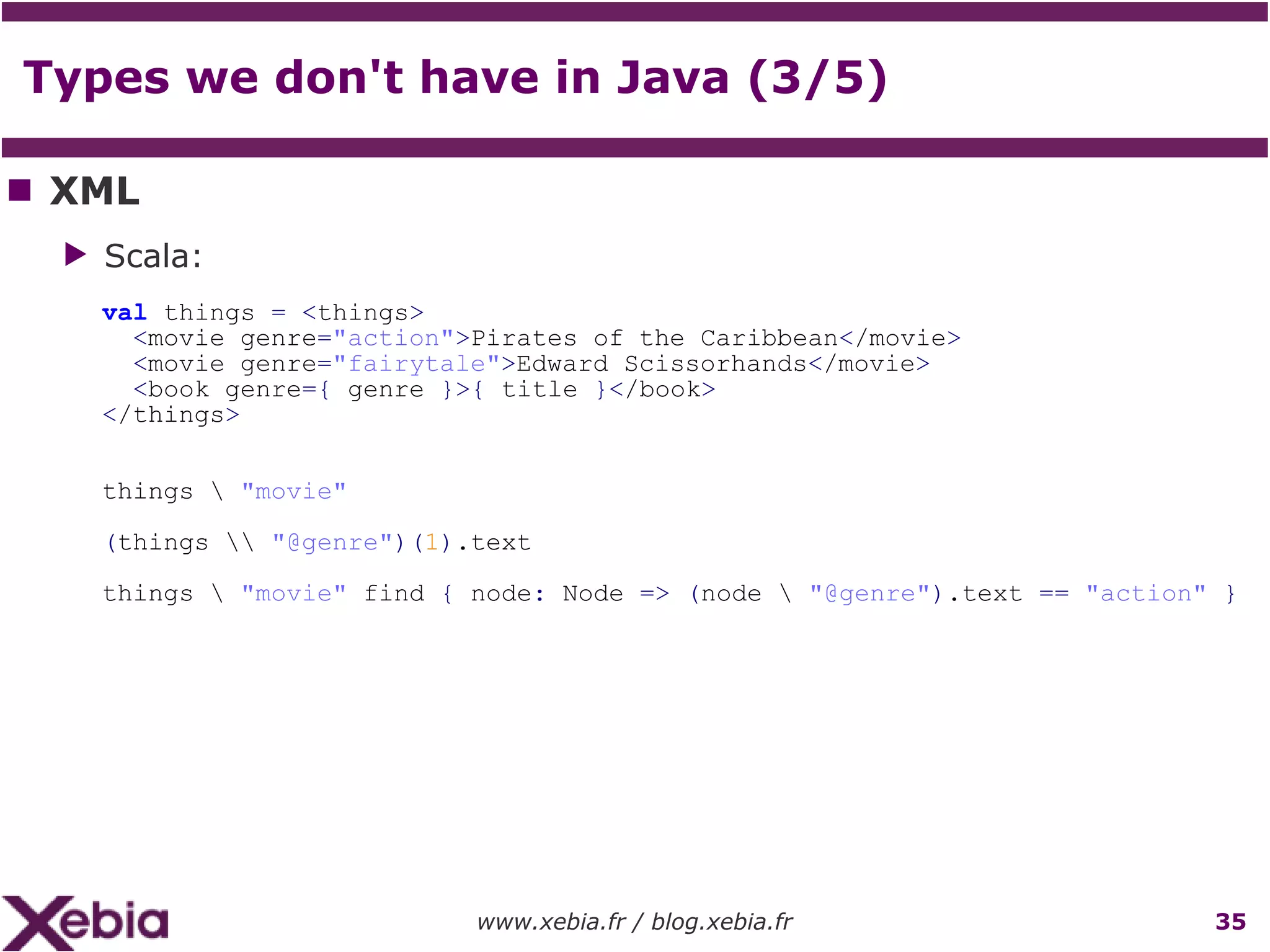
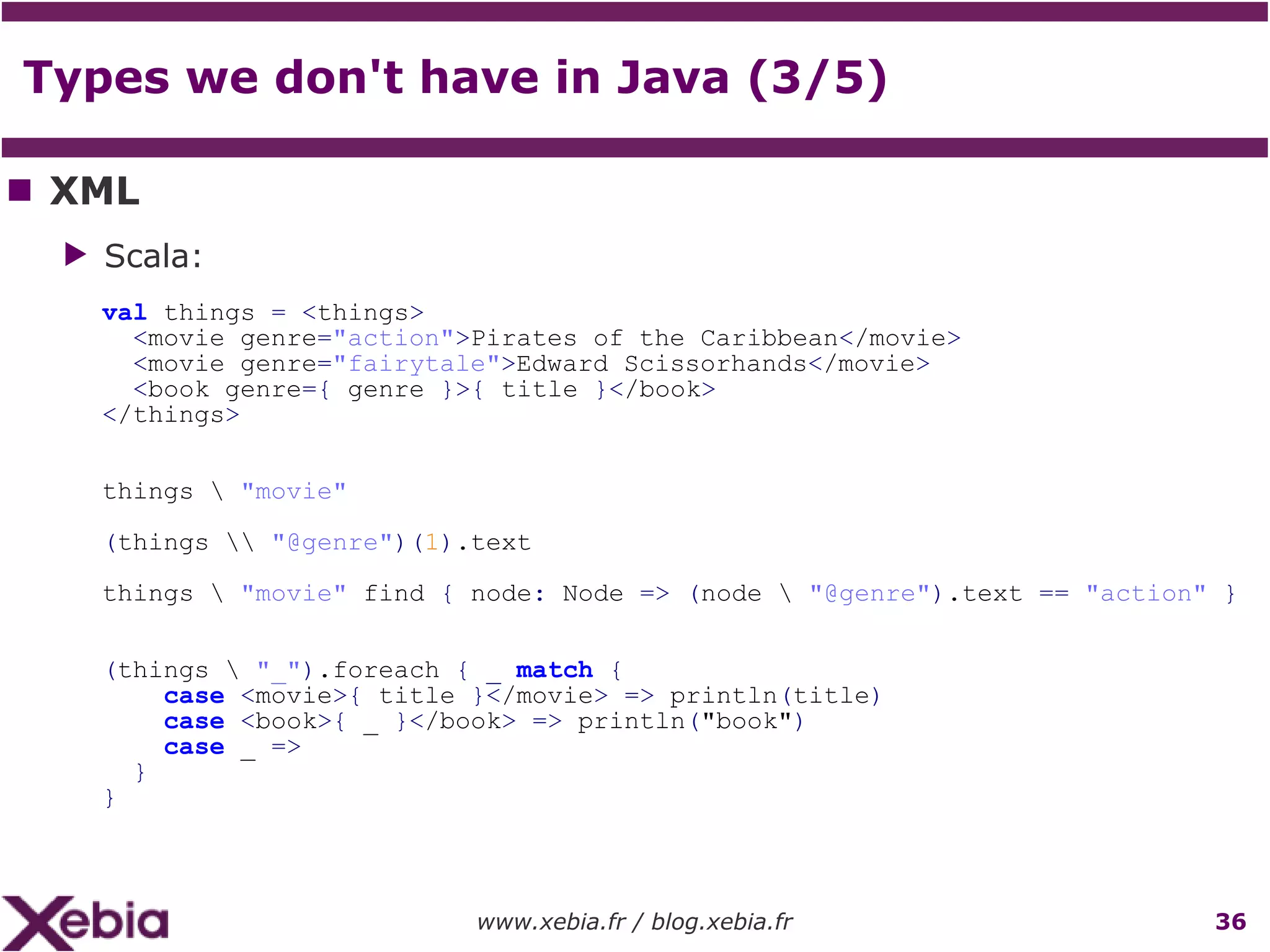
![Types we don't have in Java (4/5) Ranges ▶ Ruby: myArray[1..3] (1..3).to_a (1..21).each{|n| print n} ▶ Scala: 0 to 10 for (i <- 0 until 10) (0 until 10 by 5).start //.end .step ▶ Haskell: [1..5] [1,1.5..5] -- 1, 1.5, 2, 2.5, ... ▶ Clojure: (range 1 21) ; actually this produces a sequence, more on that later www.xebia.fr / blog.xebia.fr 37](https://image.slidesharecdn.com/prez-110918035657-phpapp01/75/XKE-Programming-Paradigms-Constructs-37-2048.jpg)
![Types we don't have in Java (4/5) Ranges ▶ Ruby: myArray[1..3] (1..3).to_a (1..21).each{|n| print n} ▶ Scala: 0 to 10 for (i <- 0 until 10) (0 until 10 by 5).start //.end .step ▶ Haskell: [1..5] [1,1.5..5] -- 1, 1.5, 2, 2.5, ... ▶ Clojure: (range 1 21) ; actually this produces a sequence, more on that later Tuples › (x, y) = (1, 2) {x, y} = {1, 2} www.xebia.fr / blog.xebia.fr 38](https://image.slidesharecdn.com/prez-110918035657-phpapp01/75/XKE-Programming-Paradigms-Constructs-38-2048.jpg)
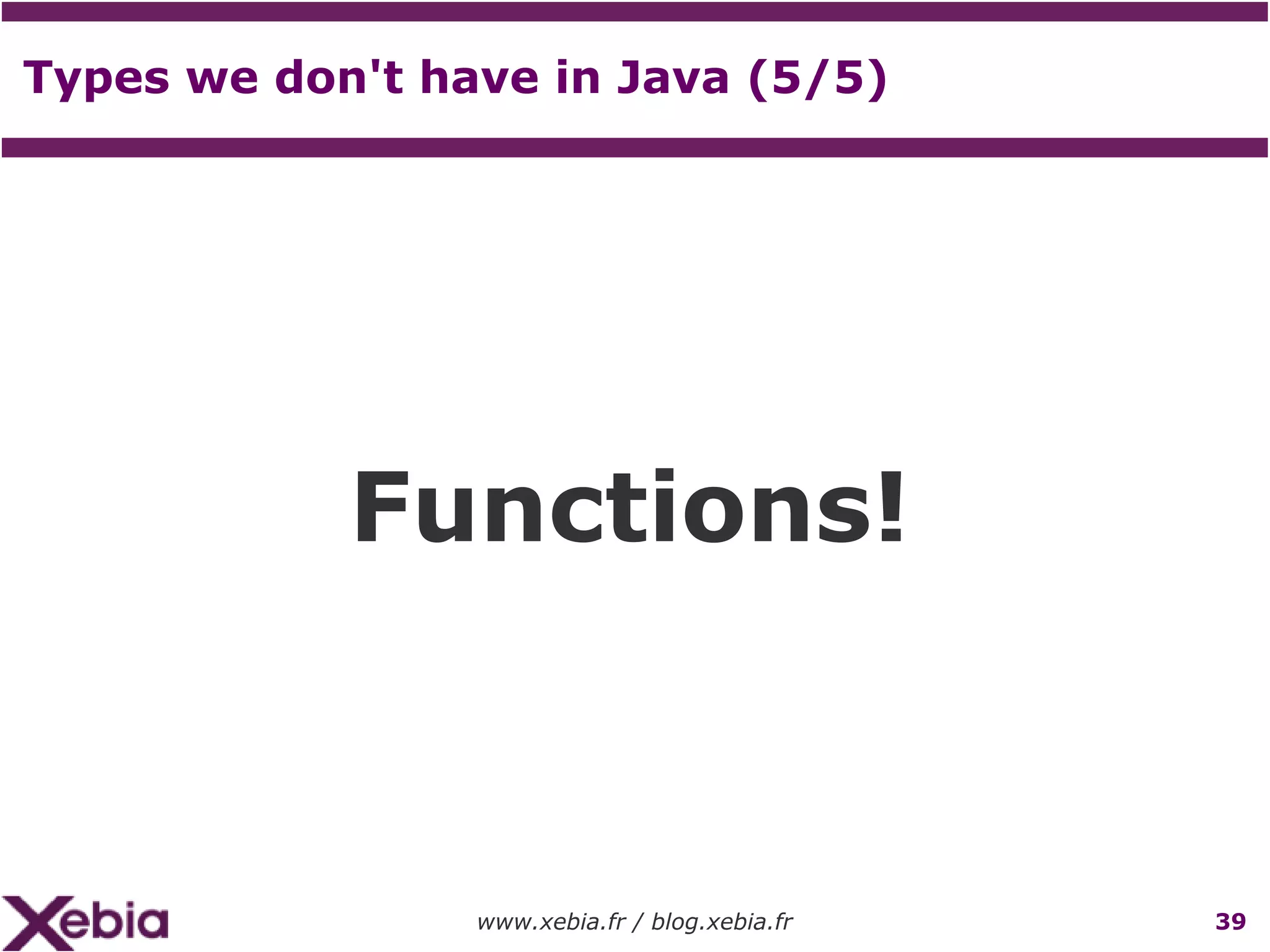
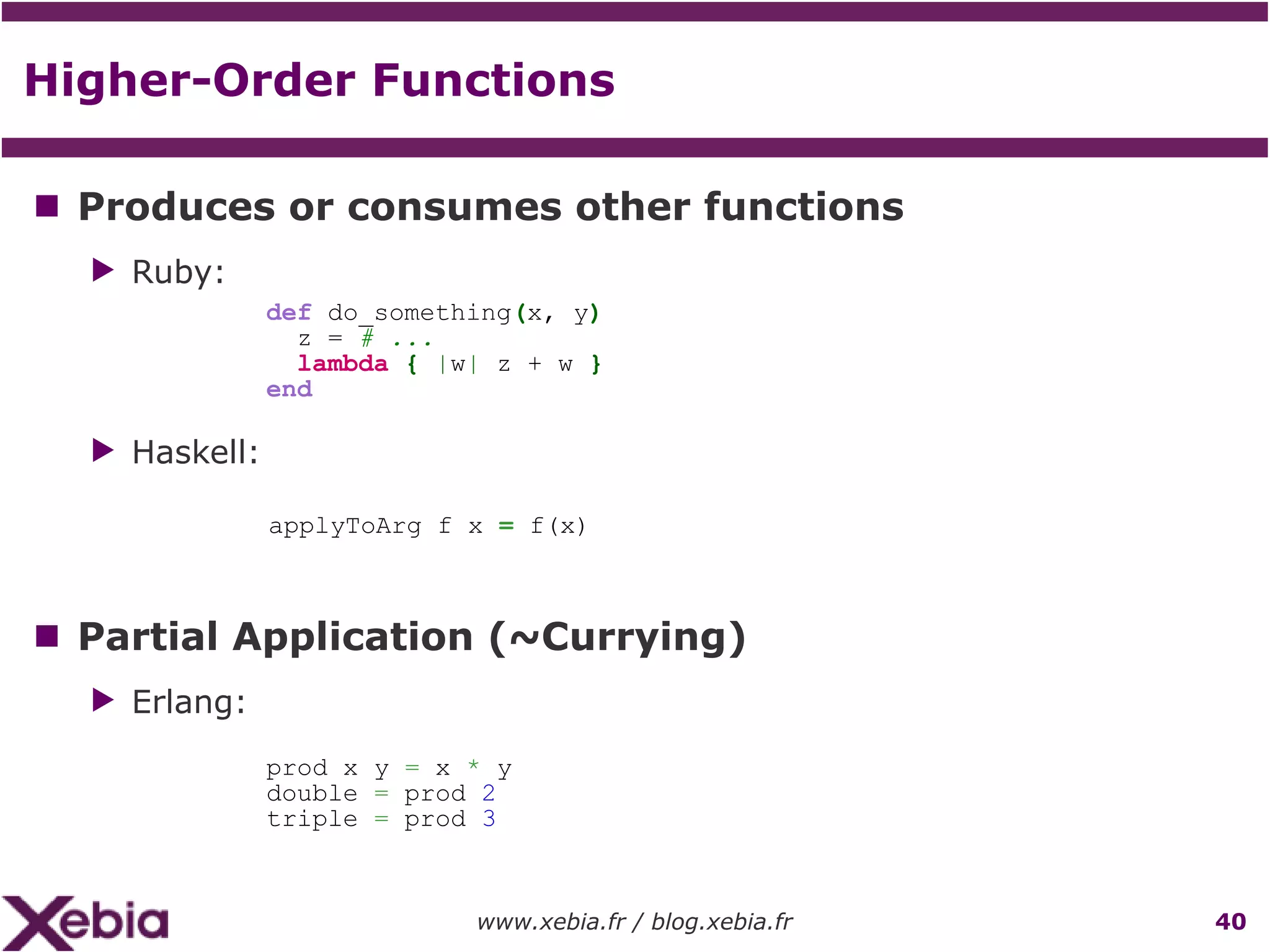
![Functions and Sequences Sequence: abstraction for “iterable things” ▶ Scala: persons foreach { p => println(p.name) } persons map { _.name } persons filter { _.female } ▶ Clojure: => (def m1 {:car 2, :doll 5, :table 1}) => (def m2 {:bike 6, :doll 3}) => (def m (merge-with + m1 m2)) {:bike 6, :car 2, :doll 8, :table 1} => (reduce (fn [acc [_ qty]] (+ acc qty)) 0 m) 17 www.xebia.fr / blog.xebia.fr 41](https://image.slidesharecdn.com/prez-110918035657-phpapp01/75/XKE-Programming-Paradigms-Constructs-41-2048.jpg)
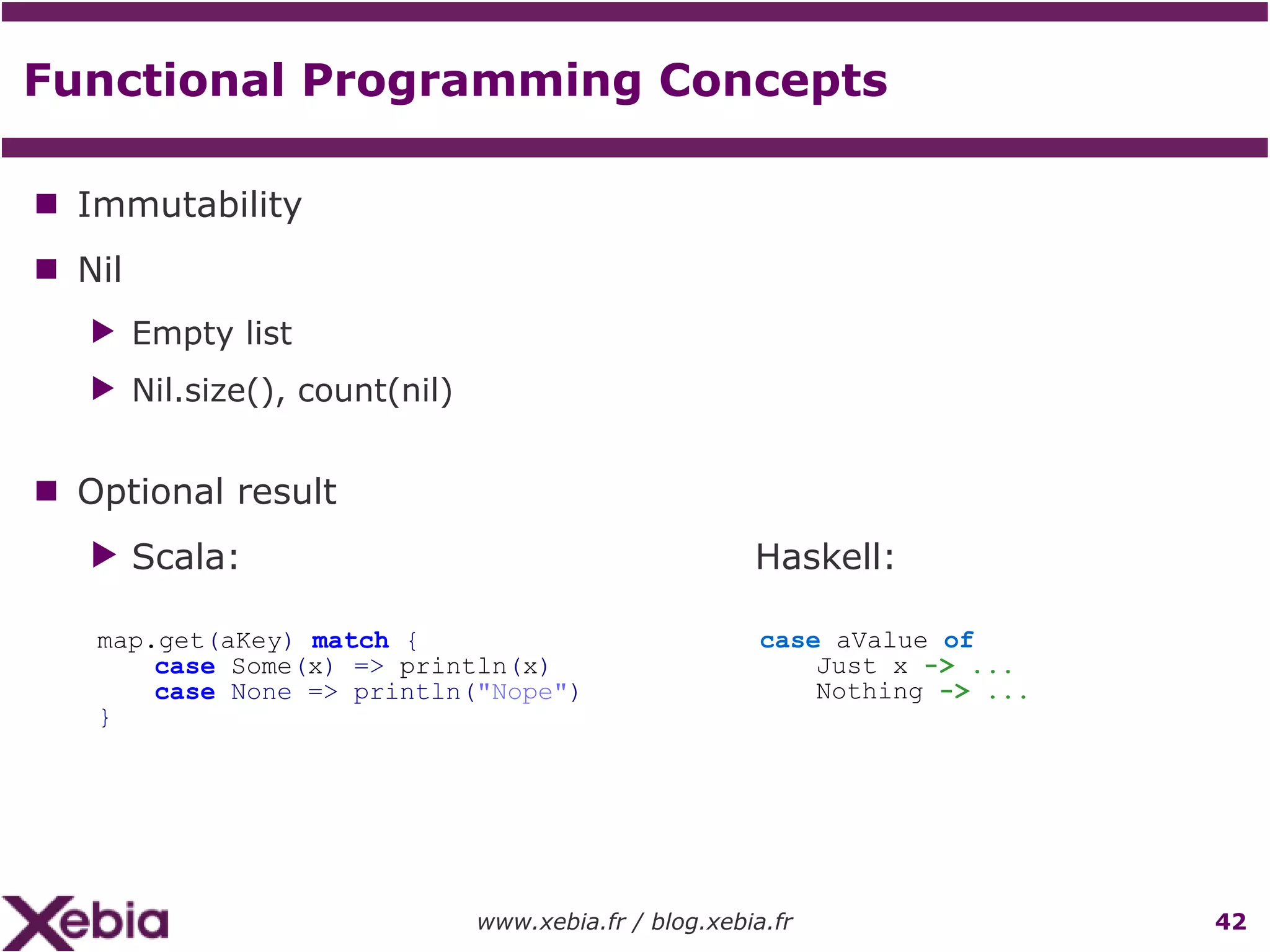
![List Comprehension Builds a list from other list(s) ▶ Erlang: [ {X, Y} || X <- lists:seq(1, 4), X < 3, Y <- [5, 6] ]. % [{1,5},{1,6},{2,5},{2,6}] ▶ Haskell: [ (x, y) | x <- [1..4], x < 3, y <- [5, 6] ] ▶ Clojure: (for [ x [1,2,3,4], y [5,6], :when (< x 3)] (* x y)) ▶ Scala: for (x <- 1 to 2; y <- List(5, 6); if x < 3) yield (x, y) www.xebia.fr / blog.xebia.fr 43](https://image.slidesharecdn.com/prez-110918035657-phpapp01/75/XKE-Programming-Paradigms-Constructs-43-2048.jpg)
![Lazy evaluation Delays the evaluation of an expression until its value is required Increases performance Allows for infinite sequences ▶ Haskell: take 4 (dropWhile (< 34098) [0, 0.5 ..]) -- [34098.0, 34098.5, 34099.0, 34099.5] zip (take 5 (iterate (2*) 10)) (take 5 (iterate (/2) 10)) -- [(10, 10.0), (20, 5.0), (40, 2.5), (80, 1.25), (160, 0.625)] ▶ Clojure => (take 5 (interpose :and (cycle [:x :k :e]))) (:x :and :k :and :e) www.xebia.fr / blog.xebia.fr 44](https://image.slidesharecdn.com/prez-110918035657-phpapp01/75/XKE-Programming-Paradigms-Constructs-44-2048.jpg)
![Lazy evaluation An alternative to recursion ▶ Fibonacci: (defn fib-pair [[a b]] [b (+ a b)]) (defn fibonacci [] (map first (iterate fib-pair [1 1]))) (take 10 (fibonacci)) ; (1 1 2 3 5 8 13 21 34 55) www.xebia.fr / blog.xebia.fr 45](https://image.slidesharecdn.com/prez-110918035657-phpapp01/75/XKE-Programming-Paradigms-Constructs-45-2048.jpg)
